Reviews
W.A. Mozart: Don Giovanni / Donna Anna (Opernhaus Zürich, Switzerland 2022)

Tuuli Takala debütierte als Donna Anna und zusätzlich am Haus. Ihr gelang eine von Grund auf musikalisch wie szenische überzeugende Interpretation. Vor allem: sie zeigte mit ihrem herrlich klaren, frischen Sopran mustergültig, dass eine stilistisch solide Mozart-Interpretation keines Dauer-Vibratos bedarf.
Tuuli Takala made her debut as Donna Anna and as well as in the opera house. She succeeded in performing a both musically and scenically convincing interpretation. Above all: with her wonderfully clear, fresh soprano she showed in an exemplary manner that a stylistically solid Mozart interpretation does not require constant vibrato.
Jan Krobot, Online Merker, 26.1.2022
Du côté des femmes, la soprano finnoise Tuuli Takala domine avec une certaine aisance les nombreuses aspérités du rôle de Donna Anna, et impose un phrasé suffisamment expressif.
On the womens’ side, the finnish soprano Tuuli Takala dominates with a certain ease the many asperities of the role of Donna Anna, and imposes a sufficiently expressive phrasing.
Emmanuel Andrieu, Opera Online, 12.2.2022
Alban Berg: Sieben frühe Lieder / Tapiola Sinfonietta, cond. Klaus Mäkelä (Live Stream, Espoo, Finland, 2020)
Sopraano Tuuli Takalan ääni kimmelsi yön taikamaailmassa Alban Bergin Seitsemässä varhaisessa laulussa
Tuuli Takalan äänen melodiakaaret liitelivät kevyesti ja luonnollisesti. Klaus Mäkelä johti Tapiola Sinfoniettaa hellin käsin, ettei lumous vain särkyisi.
Sopraano Tuuli Takala, kapellimestari Klaus Mäkelä ja Tapiola Sinfonietta olivat dream team, unelmatiimi Alban Bergin laulusarjaan Seitsemän varhaista laulua (Sieben frühe Lieder). Bergin myöhäisromanttiset laulut soivat valohämyisessä yöllisessä ihmemaailmassa, joka oli täynnä kuiskivia luonnonääniä ja rakkauden taikaa. Tuuli Takalan kaunis ja korkea sopraano oli ihanteellinen instrumentti Bergin lauluihin. Hänen äänensä melodiakaaret liitelivät ja nousivat kevyesti ja luonnollisesti. Huippusävelet syttyivät täysin pakottomasti, kuin itsestään. Hiljainen kaipuu ja ekstaattiset hetket kimmelsivät monin herkin vivahtein, milloin rauhallisesti, milloin onnelliseen intohimoon syttyen. Klaus Mäkelä johti Tapiola Sinfoniettaa hellin käsin, kuin varoen, ettei lumous vaan särkyisi. Kuului yöllistä luonnonlyriikkaa hyväilevine sivuäänineen ja salaperäisine sointiväreineen. Kuuntelin konsertin reaaliaikaisen striimauksen uusilla kuulokkeillani. Sointivaikutelma oli yllättävänkin hyvä. Kaikki äänet erottuivat läpikuultavasti ja ilmeikkäästi ja sulautuivat sopusuhtaisiksi kokonaisuuksiksi.
Soprano Tuuli Takala’s voice glittered in the magical night world of Alban Berg’s Seven early songs.
The melodic lines of Tuuli Takala’s voice soared gently and naturally. Klaus Mäkelä conducted the Tapiola Sinfonietta with tender hands, so that the spell would not be broken.
Soprano Tuuli Takala, conductor Klaus Mäkelä and the Tapiola Sinfonietta were the dream team for Alban Berg’s song cycle Seven Early Songs (Sieben frühe Lieder). Berg’s late romantic songs play in a dimly lit night wonderland full of whispering sounds of nature and the magic of love. Tuuli Takala’s beautiful and high soprano was an ideal instrument for Berg’s songs. The melodic arcs of her voice glided and ascended lightly and naturally. The top notes ignited completely without force, as if by themselves. Quiet longing and ecstatic moments glistened with many sensitive nuances, sometimes calmly, and sometimes bursting into a euphoric passion. Klaus Mäkelä led the Tapiola Sinfonietta with a gentle hand, as if to be careful not to break the enchantment. There was nocturnal lyricism of nature to be heard, with caressing murmurs and mysterious tonal colors. I listened to the live streaming of the concert with my new headphones. The sound impression was surprisingly good. All the tones stood out translucently and expressively, and merged into harmonious entities.
Hannu-Ilari Lampila, Helsingin Sanomat, 19.12.2020
W.A. Mozart: Die Zauberflöte / Pamina (Semperoper Dresden, Germany 2020)

Die 2015 aus Finnland ins Hausensemble gekommene Tuuli Takala kam, nach ihrem Berliner Ausflug als Königin der Nacht, mit der Pamina sowohl im Gesang, als auch der Darstellung mit ihrer Natürlichkeit als rebellierender Teenager und andererseits mit ergreifender menschlichen Tiefe hervorragend zurecht.
After her excursion to Berlin as the Queen of the Night, Tuuli Takala, who came to the house ensemble from Finland in 2015, got along outstandingly with Pamina, both vocally as well as in the character portrayal with her naturalness as a rebellious teenager and on the other hand with gripping humane depth.
Thomas Thielemann, IOCO, 4.11.2020
Tuuli Takala feierte als Pamina ein bejubeltes Rollendebüt. Lyrisch betragen und mit Koloraturgirlanden wahrte sie eine mädchenhafte Leichtigkeit, ohne Pamina “leichtgewichtig” werden zu lassen – nach dem Bild, in welches sich Tamino verliebte, weckte sie weitere Begehrlichkeiten.
Tuuli Takala celebrated an acclaimed role debut as Pamina. Lyrically carried, and with coloratura garlands, she maintained a girlish lightness without letting Pamina become “lightweight” – in accordance with the image with which Tamino fell in love, she aroused further desires.
Wolfram Quellmalz, Dresden Neueste Nachrichten, 3.11.2020
(paper version only)
Tuuli Takala als Pamina und Joseph Dennis als Tamino glänzten vokal wie spielerisch in ihrer so lebe- wie liebevollen Jugendlichkeit …
Tuuli Takala as Pamina and Joseph Dennis as Tamino shone both vocally and theatrically in their ever so lively and loving youthfulness …
Michael Ernst, NMZ, 3.11.2020
Tuuli Takala konnte mit ihrem Rollendebüt als Pamina uneingeschränkt überzeugen. Die erste Strophe “Bei Männern welche Liebe fühlen” fehlte schmerzlich. Dass sie trotz der recht zupackenden und robusten Rollenanlage, mit wadenhohen Lacklederstiefeln unterm Tüllkleid, zu berührenden, lyrischen Tönen fand, war bewegend.
Tuuli Takala was able to convince without limits with her role debut as Pamina. The first stanza of “Bei Männern welche Liebe fühlen” was sorely missing [in this version]. The fact that she found touching, lyrical tones even despite the rather vigorous and robust role design, with calf-high patent leather boots under a tulle dress, was moving.
Jens Daniel Schubert, Sächsische Zeitung, 3.11.2020
Tuuli Takala ist eine Pamina jenseits nur mädchenhafter Ausstrahlung, dicht und kraftvoll ist ihr Sopran.
Tuuli Takala is a Pamina beyond just girly charisma, her soprano is dense and powerful.
Clemens Haustein, Frankfurter Allgemeine, 3.11.2020
Die beiden Liebespaare ergänzen sich zu gleichwertigen Pärchen. … Tuuli Takala als Pamina verfügt über eine sehr lyrisch ausgeprägte Stimme und begeistert vor allem mit Ach ich fühl’s, es ist verschwunden.
Both of the two lover couples complement each other to become equal pairs. … Tuuli Takala as Pamina has at her disposal a very lyrically distinctive voice and enthrals especially with “Ach ich fühl’s, es ist verschwunden”.
Oliver Hohlbach und Kollegen, Operapoint, 4.11.2020
Tamino und Pamina sind mit Einspringer Joseph Dennis und Tuuli Takala sehr hörenswert.
Tamino and Pamina are with the step-in of Joseph Dennis and with Tuuli Takala highly worth hearing.
Mareile Flatt-Baier, Orpheus-Magazin, Nov. 2020
W.A. Mozart: Arias / Tapiola Sinfonietta, cond. Jonas Rannila (Espoo, Finland, 2020)
Tapiola Sinfonietan kosertti todisti, että Tuuli Takalan lyyrisen sopraanon säteilevä kauneus on kasvanut.
Tuuli Takalan lyyrinen sopraano on viime aikoina laajentunut ja voimistunut. Samalla sen säteilevä kauneus tuntuu vain kasvaneen ja saaneen lisää intohimoisuutta. Huippusävelet kilisivät voitokkaan vapautuneesti. Ryöstö seraljista -oopperan Konstanzeksi Takalan ääni on aivan omiaan. Konstanzen Traurigkeit-aaria helisi ja kaartui pakahduttavan surullisena. Don Giovannin Donna Annan aariassa Takala osoitti, että hänessä on tämän roolin vaatimaa kestävyyttä, äärimmäisen pitkiä linjoja ja dramaattista koloratuuritaitoa. Chi sa -aaria oli briljanttia kuviotaituruutta kahden syvän murheen täyttämän suuren aarian välissä. Konsertin jatkoilla Takala lauloi Tuula Hällströmin säestämänä Järnefeltin, Madetojan ja Sibeliuksen lauluja. Hän kuuluu mielestäni kaikkien aikojen parhaisiin suomalaisten laulujen tulkkeihin. Hänen luonnollisen kaunis tunneherkkyytensä oli suorastaan liikuttavaa.
The concert of the Tapiola Sinfonietta proved that the radiant beauty of Tuuli Takala’s lyrical soprano has grown.
Tuuli Takala’s lyrical soprano has recently expanded and gained strenght. At the same time, its radiant beauty seems to have only grown and gained more passion. The top notes rang victoriously and with liberation. Takala’s voice is spot on for the role of Konstanze in the opera The Abduction from the Seraglio. Konstanze’s Traurigkeit-aria glistened and curved in gripping sadness. In Donna Anna’s aria from Don Giovanni, Takala showed that she has the stamina required for this role; extremely long lines, and dramatic coloratura skills. The Chi sa -aria was a number of brilliant coloratura virtuosity between the two grand arias filled with deep sorrow. In the after patry of the concert, Takala sang songs by Järnefelt, Madetoja and Sibelius accompanied by Tuula Hällström. In my opinion, she belongs to the best interpreters of Finnish art song to this day. Her naturally beautiful emotional sensitivity was nothing less than heart-touching.
Hannu-Ilari Lampila, Helsingin Sanomat, 12.9.2020
Tuuli Takala har en förträfflig sångröst
Jonas Rannila och Tuuli Takala stod för gedigna Mozart tolkningar med Tapiola Sinfonietta.
Konserten inledde prisbelönta operasångerskan Tuuli Takalas tid residentartist i Tapiola och det är kanske ingen slump att hon har vuxit upp och gått i musikskola i området och är bekant med Tapiolasalen sedan barndomen. De tre ariorna hon valde bjöd på mycket olika karaktärsbilder. Welcher Wechsel … Traurigkeit beskriver en övergiven Konstanze som just har skiljts från sin älskade Belmonte, medan konsertarian Chi sà, chi sà, qual sia ger sopranen möjlighet till virtuosa koloraturer.
Takala har en förträfflig sångröst och behärskar sitt insttrument fullständigt. Tolkningarna var noggranna med hisnande toner i det högsta registret. Ändå saknades något för mig, speciellt under Donna Annas aria ur Don Giovanni. I Crudele! Non mi dir begär Donna Anna att Don Ottavio skulle sluta prata om äktenskap eftersom hon ännu sörjer sin far som Don Giovanni har dödat. Samtidigt förklarar hon sin kärlek till Don Ottavio. Trots att Takala levererade varje ton nästan perfekt, fattades förtvivlan och desperation.
Efter huvudkonserten presenterade Takala med pianistpartner Tuula Hällström ett efterspel med nägra sånger av Järnefelt, Madetoja och Sibelius. Här var stämningen mera informell och man fick verkligen njuta av Hällström’s skickliga pianospel. Takalas val att sjunga älskade finska lieder var mycket uppskattat från publikens sida.Tuuli Takala has an excellent singing voice
Jonas Rannila and Tuuli Takala were responsible for solid Mozart interpretations with the Tapiola Sinfonietta
The concert initiated the beginning of award-winning opera singer Tuuli Takala’s time as resident artist in Tapiola, and it is perhaps no coincidence that she has grown up and attended music school in the area and has been familiar with the Tapiola Hall since childhood. The three arias she chose offered very different character images. Welcher Wechsel … Traurigkeit describes a forlorn Konstanze who has just been separated from his beloved Belmonte, while the concert aria Chi sà, chi sà, qual sia gives the soprano the opportunity for virtuoso coloraturas.
Takala has an oustanding singing voice and masters her instrument completely. The interpretations were precise, with breathtaking tones in the highest register. Still, something was missing for me, especially during Donna Anna’s aria from Don Giovanni. In “Crudele! Non mi dir”, Donna Anna asks that Don Ottavio should stop talking about marriage, because she is still mourning her father, whom Don Giovanni has killed. At the same time, she declares her love for Don Ottavio. Although Takala delivered every note almost perfectly, there was despair and desperation lacking.
After the main concert, Takala presented with pianist partner Tuula Hällström an after play with some songs by Järnefelt, Madetoja and Sibelius. Here the atmosphere was more informal and you really got to enjoy Hällström’s skillful piano playing. Takala’s choice to sing beloved Finnish songs was much appreciated by the audience.Fiona Chow, HBL, 14.9.2020
Residenssitaiteilijan vahva näyttö
Tapiola Sinfonietta ehti avaamaan syyskautensa hieman naapurikaupungin orkestereja myöhemmin. Kunniakapellimestari Jean-Jacques Kantorowin piti alun perin johtaa tämä konsertti, mutta hänen paikkaajakseen oli kiinnitetty Jonas Rannila. Solistina kuultiin kauden residenssitaiteilijana aloittanutta, espoolaislähtöistä sopraano Tuuli Takalaa.
…Ensimmäisenä Takalan laulamana numerona kuultiin Welcher Wechsel herrscht… Traurigkeit ward mir zum Lose. Kyseessä on Konstanzen resitatiivi ja aaria oopperasta Ryöstö seraljista. Toisena oli vuorossa konserttiaaria Chi sà, chi sà, qual sia ja viimeisenä Crudele? Ah! no mio bene, joka on Donna Annan aaria Don Giovannista.
Hienoja olivat kaikki esitykset ja Takalan teknistä varmuutta oli jälleen suuri ilo kuunnella. Myös hänen äänityyppinsä ja äänenvärinsä vähittäistä muuttumista on mielenkiintoista seurata, kun kuitenkin suhteellisen harvoin pääsen kuulemaan sopraanoamme, joka laulaa enimmäkseen Dresdenissä ja muualla Euroopassa.Pienen tauon jälkeen Tapiolasalissa tarjoiltiin konsertin jatkot, jossa Takala esiintyi pianisti Tuula Hällströmin kanssa. Ohjelmaksi oli valittu kuusi suomalaista laulua, joista viisi löytyy myös duon vuonna 2018 ilmestyneeltä Tuulia-levyltä. Kappaleet olivat Armas Järnefeltin Leivo ja Du, Leevi Madetojan Taas kaukaa laulavat lauluaan ja Yrtit tummat sekä Jean Sibeliuksen Norden ja Var det en dröm? Näpsäköitä esityksiä, mutta Sibeliuksen laulujen tulkinnat eivät mielestäni yltäneet aivan muiden tasolle. Hällströmin ensiluokkaisesta pianismista kuitenkin plussaa! Ylimääräisinä kuultiin kansanlauluosastoa: Läksin minä kesäyönä käymään ja Minun kultani kaunis on.
Strong display of the Residence Artist
After a short break, the after party of the concert was served in the Tapiola Hall, where Takala performed with pianist Tuula Hällström. Six Finnish songs had been chosen for the program, five of which can also be found on the duo’s 2018 record album Tuulia. The songs were Armas Järnefelt’s Leivo and Du, Leevi Madetoja’s Taas kaukaa laulavat lauluaan and Yrtit tummat, and Jean Sibelius’s Norden and Var det en dröm? Saucy performances, but in my opinion the interpretations of the Sibelius songs did not quite reach the level of the others. However, a plus for Hällström’s first-class pianism! As encores, we heard from the Finnish folk song tradition: Läksin minä kesäyönä käymään and Minun kultani kaunis on.
Germont, Oopperaa-blog, 12.9.2020
G. Verdi: La Traviata / Violetta Valéry
(Opéra-Théâtre de Metz Métropole, France 2020)
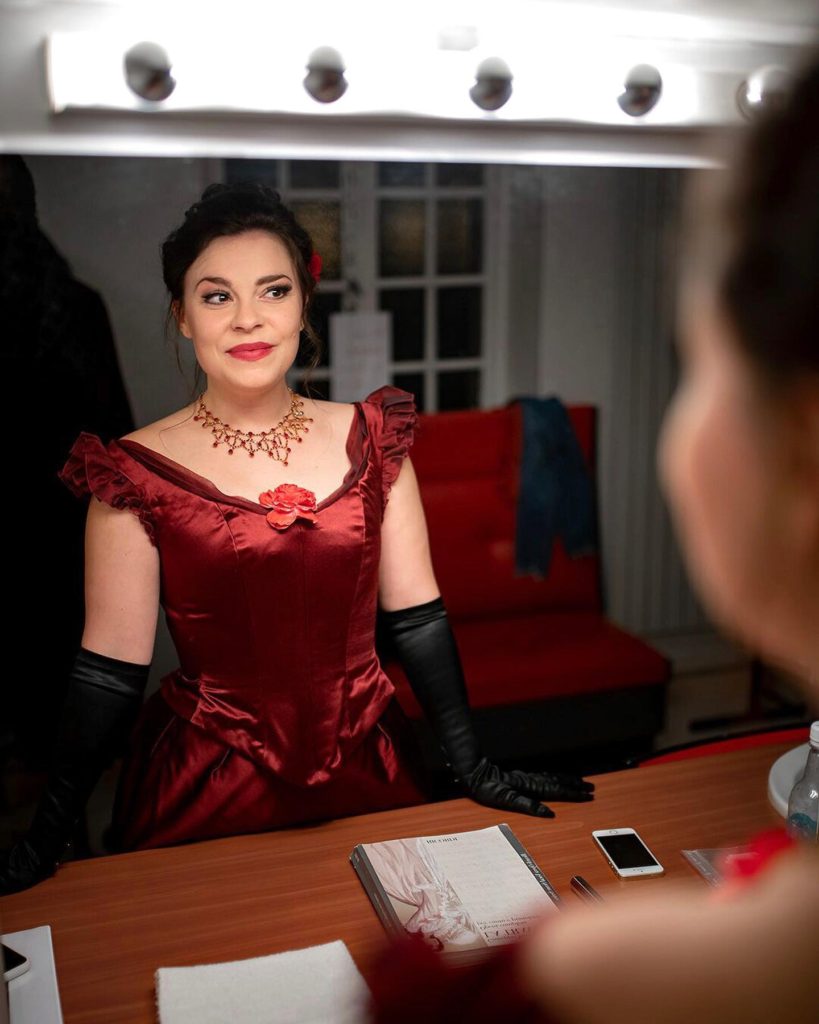
“Une voix d’exception.” – “An exceptional voice.”
Par contre, la voix de Tuuli Takala, chaude, homogène, agile, nous vaut une scène et air (« E strano… Follie ! Follie !… Sempre libera ») de belle facture. Si les phrases, hachées, nous font douter de sa longueur de voix, la suite démentira cette réserve : il s’agissait du choix délibéré de traduire l’exaltation amoureuse. La jeune Finlandaise, mozartienne accomplie, lauréate de prestigieux concours, est peu connue chez nous, malgré sa participation à nombre de réussites internationales. Certes elle avait déjà chanté Gilda, sa seule incursion chez Verdi, avant que lui soit proposé d’être Violetta, il y a deux ans. Mais, passer de la Reine de la nuit à ce rôle d’une rare exigence n’a guère souri à celles qui l’on tenté … N’est pas Violetta qui veut, on l’a dit, tant la richesse de la personnalité appelle la palette expressive la plus riche, assortie de moyens superlatifs. La prise de rôle est convaincante. On oublie les prouesses vocales, pleinement assumées, pour la vérité dramatique, essentielle. Tuuli Takala a l’émission ample, un solide médium, de splendides aigus, le legato, les couleurs, avec le sfumato, d’exquis piani, et fait sien le personnage, sa richesse, sa profondeur comme sa fragilité. Pas l’ombre d’un effort dans les passages les plus exigeants : la simplicité au service de la vérité psychologique. La diction est superbe, appui constant de la ligne vocale. Sans surcharge, elle donne aux deux derniers actes une rare densité, naturelle. L’« Addio del passato » est miraculeux de soutien, de sensibilité. Une voix d’exception.
On the contrary, the voice of Tuuli Takala, warm, homogeneous, agile, gives us a beautifully crafted scene and aria (“E strano… Follie! Follie! … Sempre libera”). If the chopped sentences at first make us doubt her length of voice, the rest will contradict this reservation: it was a deliberate choice to translate her exaltation of love. The young Finn, an accomplished Mozartian, winner of prestigious competitions, is little known to us, despite her participation in a number of international successes. Indeed she had already sung Gilda, her only foray into Verdi, before she was offered to be Violetta two years ago. But, to pass from the Queen of the Night to this role of a rare requirement, hardly smiled on those who attempted it… Is it not Violetta who wants, as we say, the richness of the personality to call for the richest expressive palette, combined with superlative means. The undertaking of the role is convincing. We forget the vocal prowess, fully assumed, for the dramatic, essential truth. Tuuli Takala has an ample emission of voice, a solid medium range, splendid high notes, legato, colors, with sfumato, exquisite piani, and makes the character her own, its richness, its depth as well as its fragility. Not a shade of effort in the most demanding passages: simplicity in the service of psychological truth. The diction is superb, constant support of the vocal line. Without overload, she gives the last two acts a rare, natural density. The “Addio del passato” is miraculous of support, of sensitivity. An exceptional voice.
Yvan Beuvard, ForumOpera.com 02.02.2020
La justesse caractérise aussi le jeu de la soprano finlandaise Tuuli Takala, jeu de scène comme performance vocale. Le personnage se construit dans le visage radieux ou désespéré, le corps à l’agonie puis galvanisé dans les derniers instants. Comme elle exprime le ressenti de sa Violetta par la gestuelle, Tuuli Takala lui offre une palette vocale très riche qui passe tous les aigus en revue. Limpides, ils éclatent ensuite, redeviennent doux et fins, offrent des descentes vertigineuses, se font mordants, déchirants, montent avec souplesse la gamme, ponctuée du plus délicat vibrato (Sempre libera-Toujours libre). Le souffle court, la portée restreinte se posent à bon escient sur l’agonie finale, marquetée de graves remarqués. L’italien est aussi naturellement dicté dans le chant que dans la lecture de la lettre. Tuuli Takala meurt ovationnée.
Justness also characterizes the performance of Finnish soprano Tuuli Takala, both her acting as well as her vocal performance. The character is built on the radiant or the desperate face, the body in agony and finally galvanized in the last moments. As she expresses the feeling of her Violetta through gestures, Tuuli Takala offers her a very rich vocal palette, which puts all the top notes on review. Clear, then they burst, become soft and fine again, offer dizzying descents, become biting, heartbreaking, flexibly climb the range, punctuated by the most delicate vibrato (Sempre libera-Always free). The shortness of breath and limited range landed wisely on the final agony, marked with serious notes. Her Italian is as naturally dictated in song as in reading the letter. Tuuli Takala dies ovationated.
Céline Wadoux, Olyrix.com 02.02.2020
A peine trentenaire, Tuuli Takala avait été repérée par Paul-Emile Fourny au festival de Savonlinna en 2016, et constitue la perle de cette production. Pour une prise de rôle, elle impressionne beaucoup, par la grâce d’un soprano lyrique large au timbre riche et sombre, très égal sur tout l’ambitus, et doté d’une projection impressionnante. Cette ancienne Reine de la nuit ne craint pas les envolées aiguës du premier acte (un «Sempre libera» bien maîtrisé) mais s’épanouit mieux encore dans les grandes phrases du deuxième (un «Amami Alfredo» formidable). Cet épanouissement nous fait craindre un moment que la mariée soit un rien trop belle, dans la mesure où cette ampleur des moyens et cette santé vocale entrent en contradiction avec la phtisie qui ne semble guère l’atteindre avant le quatrième acte, malgré le sang révélé dans les mouchoirs. C’est alors que la soprano finlandaise se mue en tragédienne, après une lecture de la lettre très personnelle et poignante, jouant de multiples couleurs et amoindrissant l’impact de sa voix jusqu’à risquer la fêlure dans un «Addio del passato» très réussi, qui se meurt en un la chancelant. La fin de l’acte est de la même eau. Il ne lui reste qu’à inscrire un peu de progressivité à cette trajectoire sur l’ensemble de l’œuvre pour parfaire une interprétation d’emblée très réussie.
Barely thirty years old, Tuuli Takala had been spotted by Paul-Emile Fourny at the Savonlinna festival in 2016, and constitutes the pearl of this production. For a role-taking, she impresses greatly, with the grace of an abundant, lyric soprano with a rich and dark timbre, very even over the entire ambitus, and endowed with an impressive projection. This former Queen of the Night does not fear the high surges of the first act (a “Sempre libera” well mastered), but flourishes even better in the long sentences of the second (with a formidable “Amami Alfredo”). This blossoming makes us fear for a moment that the bride is a little too beautiful, to the extent that this breadth of means and this vocal health contradict the phthisis which hardly seems to reach her before the fourth act, despite the blood revealed in handkerchiefs. That’s when the Finnish soprano turns into a tragédienne, after reading the very personal and heart moving letter, playing with multiple colors and lessening the impact of her voice until risking a crack in a very effective “Addio del passato”, which ended in a dying, tottering high “a”. The end of the act went with the same flow. All that remains is to add a little progressiveness to this trajectory throughout the work to perfect an interpretation, which was already immediately very successful.
Philippe Manoli, ConcertoNet
Un des intérêts de cette reprise résidait dans le renouvellement presque total de la distribution. Le public messin aura ainsi découvert l’incarnation en Violetta de la jeune chanteuse finlandaise Tuuli Takala. Les moyens sont clairement ceux d’un soprano lyrique léger, ce qui permet à l’interprète de triompher de tous les écueils techniques du premier acte. Si le deuxième acte trouve notre Violetta un peu à la limite de ses moyens, la maîtrise vocale de la cantatrice lui permet de dominer sans embuche l’ensemble concertant du troisième tableau, et surtout de trouver les fines nuances et les accents bouleversants dont il y a besoin pour la scène finale.
One of the interests of this remake is in the almost total renewal of the cast. The public in Metz will have discovered the incarnation of Violetta in the young Finnish singer Tuuli Takala. The means are clearly those of a light lyric soprano, which allows the performer to triumph over all the technical pitfalls of the first act. If the second act finds our Violetta a little at the limit of her means, the vocal mastery of the singer allows her to dominate without difficulty the big ensemble concertante of the third tableau, and especially to find the fine nuances and overwhelming accents, which one needs for the final scene.
Pierre Degott, ResMusica 07.02.2020
G. Donizetti: Lucia di Lammermoor / Title Role
(Semperoper Dresden, Germany 2019)
Viel Kondition verlangt die über weite Strecken mit ihrem Gesang immer präsente Gestalt der Lucia, die mit Sensibilität und Dramatik und reichlich Koloraturen brillieren muss. Tuuli Takala setzte ihre weiche/klangvolle Stimme ein, unterschlug keinen Ton und meisterte die Rolle mit sehr feinem Piano/Pianissimo, guter Phrasierung und auch entsprechender Dramatik. Sie sang vor allem mit Leidenschaft. In jedem Duett und jeder Szene übernahm sie die Führung mit unaufdringlicher Dominanz und gutem Klang. Im Duett mit Edgardo gelang beiden eine völlige klangliche Übereinstimmung, die ihre Liebe glaubhaft erscheinen ließ.
The character of Lucia, who is always vocally present over long stretches, demands a lot of stamina, and must shine with sensitivity and drama and plentiful coloratura. Tuuli Takala used her soft/sonorous voice, did not omit any note and mastered the role with very fine piano/pianissimo, good phrasing as well as appropriate drama. Above all, she sang with passion. In every duet and every scene, she took the lead with unobtrusive dominance and good sound. In the duet with Edgardo, the two achieved a perfect sonic match, which made their love appear believable.
Ingrid Gerk, Online Merker 03.01.2020
V extrémně virtuózní titulní roli se představila finská sopranistka Tuuli Takala, která upoutala hebkým, sytým hlasem, který nezněl jen jako automat na výrobu koloratur, ale pro vykreslení portrétu nešťastné dívky měl i lyrické kouzlo.
In the extremely virtuoso title role, the Finnish soprano Tuuli Takala captured a soft, rich voice that not only sounded like a coloratura machine, but also had a lyrical charm to portray the unhappy girl.
Věra Drápelová, iDNES.cz 20.12.2019
W.A. Mozart: Die Zauberflöte / the Queen of the Night
(Royal Opera House Covent Garden, London, UK 2019)
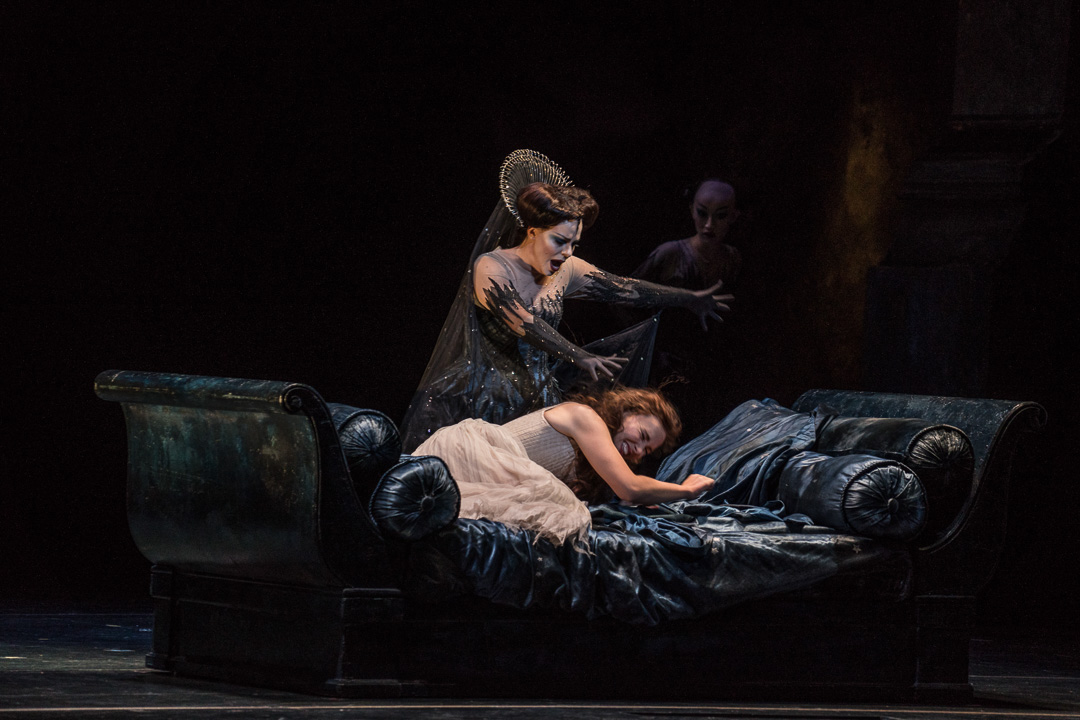
Photo: Pierre Tappon Photography
“Tuuli Takala is an imperious Queen of the Night at Covent Garden.”
“Finnish soprano Tuuli Takala brought the house down on first night with her big Queen of the Night numbers. As a furious mother giving it all she’s got she ripped through the stratosphere, as bright and defined as the stars in her inky realm.”
Culture Whisper
“He [Sarastro] is an excellent foil to Tuuli Takala’s Queen of the Night, lukewarm at first, but then finding focus, her coloratura as sharp and gleaming as the weapon she gives to her daughter.”
The Times
“In its 16 years, the production has seen many different singers come and go, and for this latest revival the cast is almost entirely new, including a number of house debuts. Chief among the latter is Finnish soprano Tuuli Takala, an experienced Queen of the Night who holds, I note from her biography, the rare distinction of having sung the role in all three Berlin opera houses (she is now based in Dresden). Her top notes were spotless, yet there’s a lustrous tone to her more ‘normal’ soprano register that gave the character depth and a believable engagement with her rage.”
Bachtrack
“This contrasts with the excellent sound that Tuuli Takala produces, which sees her coloratura in this and ‘Der Hölle Rache’ reveal cleanness, subtlety and accuracy as she also demonstrates impeccable phrasing.”
Opera-Online
“The Royal Opera has brought back this wonderfully straightforward, witty and stylish production of Mozart’s last opera, The Magic Flute, with a terrific house debut from the Finnish soprano Tuuli Takala.”
“Their Queen, sung by the Finnish soprano Tuuli Takala, was the vocal star of the show, and her bravura arias (one of which is possibly the famous operatic tune ever written) were sung with exemplary control and panache. Combining them as she did, with silent movie histrionics, she brought the house down – twice.”
Town and Country Magazine
OperaToday
“There is plenty of drama from the Finnish soprano Tuuli Takala as an admirable Queen of the Night. Her arias blazed with conviction and brought sustained applause for her efforts.”
Opera Today
“L’arduo compito di interpretare la Regina della notte spetta al soprano finlandese Tuuli Takala, che centra con sicurezza tutti i sovracuti nell’aria “Der Hölle Rache kocht in meinem Herzen” oltre a rendere con credibilità la sete di potere e la cattiveria di Astrifiammante.”
“The arduous task of interpreting the Queen of the night belongs to the Finnish soprano Tuuli Takala, who confidently centers all the high notes in the aria “Der Hölle Rache kocht in meinem Herzen”, as well as credibly rendering the thirst for power and the wickedness of this star-blazing Queen.”
Connessi all’opera
“Takala’s soprano is a sensation, causing a wave of thunderous applause from audience members after each performance.”
The Up-Coming
“Finnish soprano Tuuli Takala gives a mixed account of the Queen of the Night, but she has the high notes all right.”
The Stage
“Unbestritten Star des Abends war die Königin der Nacht der großartigen finnischen Sopranistin Tuuli Takala. Ihre Koloraturen waren nicht im geringsten schrill – wie leider so oft bei dieser Figur. Im Gegenteil: Ihre Koloraturen, sicher in den Höhen, präzis in den Tempi und geschmeidig in den Läufen erfreuten die Zuschauer mit ihrem Wohlklang.”
“Undisputed star of the evening was the Queen of the Night of the splendid Finnish soprano Tuuli Takala. Her coloratura were not in the slightest shrill – as unfortunately so often wtih this figure. On the contrary: her coloraturas, secure in the heights, precise in the tempi and supple in the runs, delighted the audience with their euphony.”
“The Queen of the Night has two major arias, one in each Act. Tuuli Takala, making her house debut, was just a little squally and imprecise in diction when she bemoaned the evil man who had stolen her daughter from her. However, by the time she turned her wrath on her own child for refusing to carry out her instructions to murder Sarastro, the voice had assumed a chilling pin-point accuracy, delivered with absolute control and yet each note barbed with venom.”
Classical source
“Finnish soprano Tuuli Takala made the Queen of the Night’s arias sound effortless, never shrill.”
The Guardian
“Likewise Tuuli Takala’s Queen of the Night. This Finnish soprano is a superb singer, and sails through her coloratura arias with accomplished ease, but she’s ice-cold where she should be anguished; she too needs tuition in the basics of characterisation.”
The Independent
“Although this run sees the 350th performance of McVicar’s production, it’s an almost entirely new cast, and there are some outstanding voices. The ‘three ladies’ are engaging and beautifully blended, but serve only as an opener for you to be blown away by their ice maiden boss, the stunning Finnish soprano Tuuli Takala who won enthusiastic ovations for her Queen of the Night arias.”
The Londonist
“Tuuli Takala’s effortless performance of the two famous coloratura arias, Der Hölle Rache and O Zittre Nicht, Mein Lieber Sohn from The Magic Flute drew rapturous applause but for me lacked the fiery anger and passion I’d anticipated. Nonetheless a totally credible Royal Opera House debut.”
London Un-attached
“So far, so clear, but things get tricky with the two mystical figures at loggerheads. Tuuli Takala, hitting the high notes, appears to be a wronged woman, but The Queen Of The Night slowly reveals herself to be a force for ignorance, holding back the cleansing advent of dawn. She appears in a chiaroscuro light reminiscent of Italian religious paintings – perhaps that Roman iconography was intended by Mozart and his librettist, Emanuel Schikaneder, Freemasons both.”
Broadway World
G. Rossini: Il viaggio a Reims / La Contessa di Folleville
(Semperoper Dresden, Germany 2019)
Die junge französische Witwe Contessa di Folleville, ständig in der Sorge um ihre extra nach der neuesten Mode geschneiderten Kleider, wurde anmutig und temperamentvoll gespielt und mit klaren prächtigen Koloraturen von der aus Finnland stammenden Ensemblesängerin Tuuli Takala mit sichtbarer Freude gesungen und gespielt.
The young French widow Contessa di Folleville, constantly concerned about her clothes – especially tailored according to the latest fashion – was played gracefully and spiritedly and sung with clear, magnificent coloraturas with visible joy by the Finnish ensemble member Tuuli Takala.
Thomas Thielemann, IOCO 1.10.2019
Mit glockenklarem Sopran begeistert Tuuli Takala in ihrer großen Arie “Partir, oh ciel! desio” und lässt dabei die Koloraturen nur so perlen.
Tuuli Takala delights with bell-clear soprano in her great aria “Partir, oh ciel! desio” and lets her coloraturas sparkle.
Thomas Molke, Online Musik Magazin 28.10.2019
Tuuli Takala gelingt es auch im größten Tumult auf der Bühne noch, den rasanten Koloraturen der affektierten Gräfin von Folleville Farbe zu verleihen.
Tuuli Takala succeeds, even in the midst of the greatest turmoil on stage, to add color into the rapid coloraturas of the affected, pretensious Countess of Folleville.
Nicole Czerwinka, Dresdner Neueste Nachrichten 30.9.2019
G. Verdi: Rigoletto / Gilda
(Savonlinna Opera Festival, Finland 2019)
Rigoletto à Savonlinna – fort en émotion
Toute la salle, et non pas seulement les Finlandais, se réjouit de voir sur le plateau Tuuli Takala (elle remplace Cristina Pasaroiu). Elle se déploie en trois Gilda aux voix différentes, d’abord sa brillance juvénile et sa technique magistrale quand elle tente en vain de communiquer avec son père introverti, répétant ses mélodies avec son soprano équilibré. À l’acte II, sa voix est imprégnée d’une larme, sur le point de briser, son apparence et sa respiration trahissent une douleur émotionnelle devenue physique, mais en s’adaptant de nouveau au langage musical de son père, les larmes vocales de Gilda se transmettent à Rigoletto et influencent son expression vocale. La défaite irrévocable s’accomplit au dernier acte : le chant de la jeune mourante, naguère si beau et fluide, devient de plus en plus essoufflé, sec et fragile – jusqu’à la note finale de Gilda, omise (ou au moins laissée inaudible) par la soprano finlandaise. La salle récompense Takala et ses collègues – y compris le chef français, qui attend son tour en riant sur le plateau – avec de longs applaudissements.
Rigoletto in Savonlinna – strong in emotion
The entire hall, and not only the Finns, rejoice to see Tuuli Takala on the stage (she replaces Cristina Pasaroiu). She unfolds as Gilda with three different voices, at first with her juvenile brilliance and her masterful technique when she tries in vain to communicate with her introverted father, repeating her melodies with her balanced soprano. In Act II, her voice is impregnated with a tear, about to break, her appearance and breathing revealing emotional pain that has become physical, but adapting again to her father’s musical language; the vocal tears from Gilda are transmitted to Rigoletto and influence his vocal expression. The irrevocable defeat is accomplished in the last act: the singing of the dying young woman, once so beautiful and fluid, becomes more and more breathless, dry and fragile – until the final note of Gilda, omitted (or at least left inaudible) by the Finnish soprano. The room rewards Takala and her colleagues – including the French conductor, who is waiting his turn laughing on the set – with long applause.
Andreas Wahlberg, Olyrix.com 4.8.2019
W.A. Mozart: Great Mass in c minor
(Kerimäki church, Savonlinna Opera Festival, Finland 2019)
Konserttiarvio – suurta juhlaa Kerimäellä
Kirkas, voimakas, koskettavan kaunis, täsmällinen, herkkä ja hurja. Mozartin c-molli-messun esitys Kerimäen kirkossa oli Savonlinnan Oopperajuhlien oman koneiston ja suomalaisen musiikkiosaamisen komea näyte.
C-mollimessu on ennen kaikkea sopraanosolistien suuri teos. Kun solisteina olivat Tuuli Takalan ja Marjukka Tepposen kaltaiset taiteilijat, saadaan suuret tunteet liikkeelle. Tuuli Takalan äänessä on syvyyttä ja laveutta, ja kuinka kauniina kuuluvatkaan hitaan osan syvät tunnot, kuinka kirkkaina soivat kuviot. Marjukka Tepposen sopraanon sävy on toinen, siinä on timanttia ja kirkkautta kautta linjan.
Duetoissa Takalan ja Tepposen äänet soivat loisteliaasti yhteen, hitaissa osissa oli pyhyyttä ja syvää kauneutta. … Takalan ja Tepposen laulun kuuntelu on puhdasta juhlaa.
Concert review – great jubilee in Kerimäki
Bright, powerful, touchingly beautiful, precise, sensitive and fierce. The performance of Mozart’s Mass in c-minor in the Kerimäki church was a grand sample of the musical skill of the Savonlinna Opera Festival’s own troupe and that of Finnish musicians.
….
The c-minor Mass is above all a great work of the soprano soloists. When there were such artists like Tuuli Takala and Marjukka Tepponen as soloists, great emotions are roused. There is depth and broadness to the voice of Tuuli Takala; and how beautifully the deep feelings of the slow movement sound, how brightly the figures ring. Marjukka Tepponen’s soprano tone is different, with diamonds and brightness across the board.
In the duets the voices of Takala and Tepponen blend gloriously together, in the slow movements there was holiness and deep beauty. … Listening to the singing of Takala and Tepponen was pure celebration.
Riitta-Leena Lempinen-Vesa, Itä-Savo 13.7.2019
F. Mendelssohn: Ein Sommernachtstraum / 10th Symphony Concert
of the Staatskapelle Dresden (Dresden 2019)
Da gerät der herausfordernde Anspruch an Chor und Gesangssolisten beinahe in den Hintergrund. Drum holen wir die zum Ausgleich nach vorn: Tuuli Takala, Sopran, und die kurzfristig für die leider erkrankte Christina Bock (gute Besserung!) eingesprungene Mezzosopranistin Stepanka Pucalkova erfüllten ihre Aufgaben so gut, klar und brillant, dass es eine einzig Freude war – und ein Kummer, dass ihre Parts so kurz geraten sind. Dasselbe ließe sich von den Chorpartien sagen, die von den Damen des Dresdner Kammerchores (Einstudierung Michael Käppler) vorzüglich ausgeführt worden sind.
The challenging demands on choir and vocal soloists are almost pushed into the background. That’s why we bring them forward to compensate: Tuuli Takala, soprano, and mezzo-soprano Stepanka Pucalkova, who stepped in at short notice for the unfortunately ill Christina Bock (get well soon!), fulfilled their tasks so well, clearly and brilliantly that it was a pure joy – and a grief that their parts are so short. The same could be said of the choral parts, which were performed excellently by the ladies of the Dresden Chamber Choir (rehearsed by Michael Käppler).
Michael Ernst, Musik-in-Dresden, 10.05.2019
R. Strauss: Der Rosenkavalier / Sophie
(Semperoper Dresden, Germany 2019)
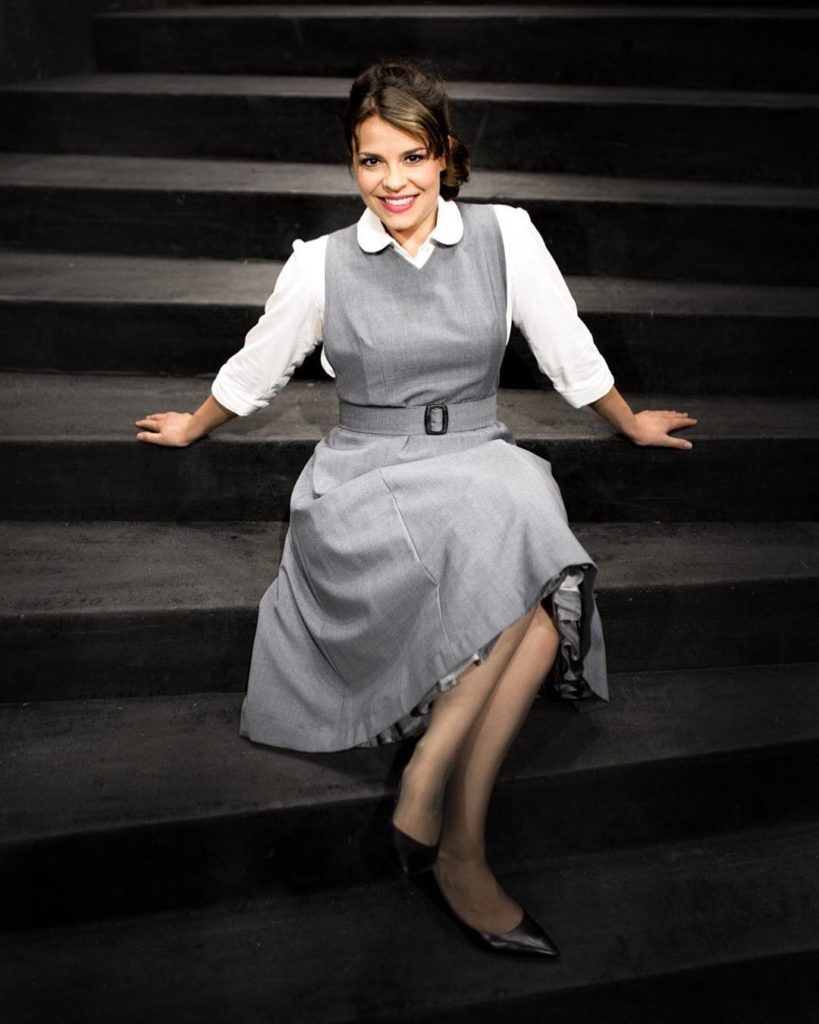
Im Überschwang
… gab es insbesondere in den Hauptpartien Debüts zu bestaunen. … Das junge Paar kam aus dem Ensemble. Zu Tuuli Takala als Sophie mit ihrer mädchenhaften Ausstrahlung und dem glockenreinen, tragfähigen Sopran kann man nur ein Prädikat finden: hervorragend.
… So avancierte die Überreichung der silbernen Rose … zu einem wirklichen Höhepunkt. Und erst recht das Terzett der Frauenstimmen am Ende – Strauss-Glück pur.In exuberance
… especially in the main roles there were debuts to marvel at. … The young couple came from the ensemble. To Tuuli Takala as Sophie, with her girlish charisma and her bell-clear, well carrying soprano voice, one can only find one predicate: outstanding.
… So the presentation of the silver rose … became a real high point. And above all, the trio of women’s voices at the end – pure Strauss-bliss.Mareile Hanns, Dresdner Neueste Nachrichten (paper version) 30.04.2019
Debussy: Ariettes oubliées, orchestrated by Robin Holloway /
Tapiola Sinfonietta & Mario Venzago
(Espoo, Finland 2019)
Tuuli Takalan sopraano kimmelsi haltioituneesti.
Tuuli Takalan kimmeltävän kirkas lyyrinen sopraano on omiaan Debussyn lauluihin. Sen linjat leijailivat kauniin kevyesti, sensuellin pehmeästi ja karusellilaulun rytmeissä tarkasti. Tunteet väreilivät vivahteikkaasti, ja ranskan artikulaatio oli tyylikästä. Epätoivo saattoi purkautua hetkellisesti, joskus myös hurmio, mutta hallitseva tunnelma oli raukean melankolinen ja luonnonläheinen.
Tuuli Takala’s soprano glistened with ecstacy.
Tuuli Takala’s glittering bright lyric soprano is apt for Debussy’s songs. Its lines floated with beautiful lightness, sensual softness, and accurately in the rhythms of the carousel song. Emotions flickered with nuance, and her French articulation was elegant. Despair would erupt momentarily, sometimes also rapture, but the dominant mood was languorously melancholic and natural.
Hannu-Ilari Lampila, Helsingin Sanomat 06.04.2019
W.A. Mozart: Die Zauberflöte / die Königin der Nacht
(Staatsoper Unter den Linden, Berlin 2019)
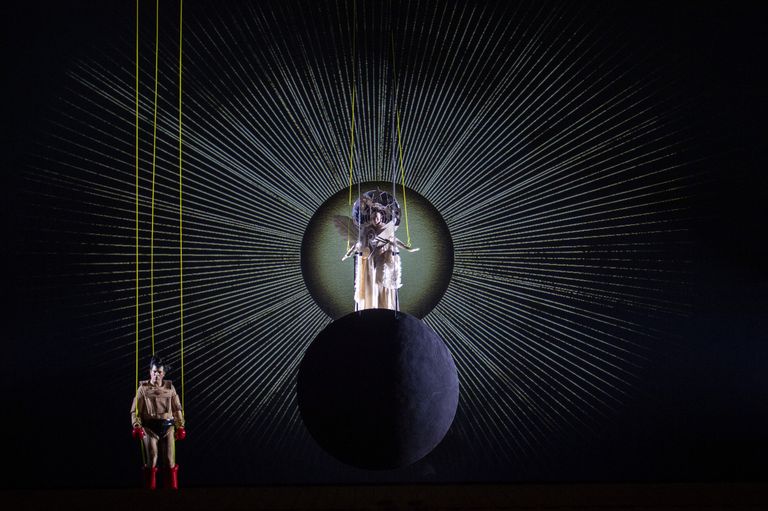
Photo: Monika Rittershaus
Tuuli Takalas Königin der Nacht in Schattenspielen gefiel mir außerordentlich mit ihren schicken Power-Koloraturen.
Tuuli Takala’s Queen of the Night in shadow play appealed to me exceptionally with her chic power-coloraturas.
Maria Ossowski, BR Klassik 18.02.2019
Chapeau vor allem für die junge, schon international gefragte finnische Koloratursopranistin Tuuli Takala. Ihre Partie, die Königin der Nacht, zählt hörbar zu ihren Paraderollen. Die Spitzentöne, vor allem bei der Zorn-Arie im 2. Akt („Der Hölle Rache“..) steigen wie Leuchtraketen in den Saal, und die Worte sind auch genau zu verstehen!
Chapeau especially for the young Finnish coloratura soprano Tuuli Takala, already internationally in demand. Her role, the Queen of the Night, counts audibly as one of her signature roles. The high notes, especially in the Fury-Aria in Act 2 (“Der Hölle Rache” ..) rise like flares in the hall, and the words are synonymous to understand exactly!
Ursula Wiegand, Online Merker 09.03.2019
Tuuli Takala nailed the quicksilver coloratura passages of the Queen of the Night but – particularly as she was suspended above the stage – might have profited from steadier guidance.
Rebecca Schmid, Classical Voice America 23.02.2019
Auf der Habenseite stehen Tuuli Takala, die eine herrliche Königin der Nacht singt: Ihren weiten Bögen nimmt man den Mutterschmerz gerne ab, ihren mühelosen Spitzentönen Mut und Hass. Außerdem versteht man jedes Wort, eigentlich ein Ding der Unmöglichkeit.
On the plus side stands Tuuli Takala, who sings a marvelous Queen of the Night: Her wide phrases diminishing the mother’s pain with pleasure, her effortless top notes showing courage and hate. Furthermore, one understands every word, virtually an impossibility.
Berliner Morgenpost (paper version), 19.02.2019
Großartig Kwangchul Youn als Sarastro. Gleiches gilt auch für Tuuli Takala als Königin der Nacht.
Kwangchul Youn was superb as Sarastro. And the same holds true for Tuuli Takala as the Queen of the Night.
Michael Pitz-Grewenig, Klassik Magazin.com 18.02.2019
… und die Königin der Nacht – außergewöhnlich klare Diktion: Koloratursopran Tuuli Takala – also als Marionetten, die von willkürlicher Kinderhand durch ihr Schicksal gesteuert werden und kaum je dagegen aufbegehren.
… and the Queen of the Night – with exceptionally clear diction from coloratura soprano Tuuli Takala – also as marionettes, who are controlled through their fate by arbitrary children’s hands and hardly ever rebel against it.
Matthias Nöther, Die Deutsche Bühne 18.02.2019
Tuuli Takala als Königin der Nacht klingt interessant damenhaft, schleppt nur ein bisschen und singt gelegentlich eine Spur zu tief.
Tuuli Takala as the Queen of the Night sounds interestingly lady-like, though dragging a bit and occasionally singing a touch too low.
Kai Luehrs-Kaiser, Kulturradio 18.02.2019
Tuuli Takala singt die Königin der Nacht mit eisiger Brillanz.
Tuuli Takala sings the Queen of the Night with icy brilliance.
Peter Uehling, Berliner Zeitung 18.02.2019
As far as the vocalists are concerned, only the interpreters of Sarastro and the Queen of the Night were noteworthy. … Soprano Tuuli Takala is a member of the Staatsoper roster [sic], and she replaced Kathryn Lewek as the Queen of the Night. Her performance was satisfactory, and she did especially well in her two arias.
José M. Irurzun, Seen and heard international 15.03.2019
Tuuli Takala (“Zum Leiden bin ich auserkoren”) war als adäquate Königin der Nacht besetzt.
Tuuli Takala (“Zum Leiden bin ich auserkoren”) was adequately cast as the Queen of the Night.
Andre Sokolowski, Kultur-Extra 13.03.2019
Gegen die bleierne Ödnis aus dem Orchestergraben können sich Tuuli Takala (Königin der Nacht) und Serena Sáenz Molinero (Pamina) noch am besten profilieren, alle anderen Sänger haben mehr oder weniger große Probleme.
Against the leaden wasteland from the orchestra pit, Tuuli Takala (Queen of the Night) and Serena Sáenz Molinero (Pamina) were the best in defining their mark, all the other singers had more or less big problems.
Uwe Friedrich, Deutschlandfunk Kultur 17.02.2019
… und Tuuli Takala als Königin der Nacht überzeugte gesanglich und gestisch.
… and Tuuli Takala as the Queen of the Night convinced both vocally and in expression.
Katharina Zawadsky, Berliner Umschau 24.02.2019
Die junge Finnin Tuuli Takala, Ensemblemitglied der Semperoper Dresden, gibt abermals in Berlin die Königin der Nacht mit gestochen scharfen Koloraturen, aber all zu braver Stimme für die höllischste aller Mutterrollen.
The young Finn Tuuli Takala, ensemble member of the Semperoper Dresden, is once again in Berlin as the Queen of the Night with razor-sharp coloraturas, but all too good and honest a voice for the most hellish of all mother roles.
Stefan Wieser, Online Merker 18.02.2019
Trotzdem sollte an dieser Stelle nicht außer Acht gelassen werden, welche außergewöhnliche Leistung es ist, anspruchsvolle Arien zu schmalzen, während man ohne festen Boden unter den Füßen fünf Meter über der Bühne in der Luft baumelt. Diese Herausforderung haben die beiden mit Bravour gemeistert. Ähnliches gilt für die finnische Sängerin Tuuli Takala. Als Königin der Nacht gesteht man ihr für ihre höchst anspruchsvollen Arien wenigstens ein kleines Fluggestell zu, das einen Hauch von Stabilität suggeriert. Trotzdem kurvt sie damit zum Teil wirklich rasant durch die Lüfte, während sie brillanteste Koloraturen in den Zuschauerraum sendet. Stimmliche Perfektion gepaart mit Showeinlage. Lediglich der körperliche Ausdruck beim Singen, der aufgrund der Marionetten-Szenerie allgemein auf der Strecke bleibt, wird bei der rachedurstigen Königin im Fluggestell besonders schmerzlich vermisst.
Nevertheless, it should not be ignored at this point, as to what an extraordinary effort it is to sing demanding arias with luster, while dangling in the air five meters above the stage without firm ground under your feet. The two mastered this challenge with flying colors. The same applies to the Finnish singer Tuuli Takala. As Queen of the Night, she is bestowed with at least a small flight frame for her highly demanding arias, suggesting a touch of stability. Nevertheless, she is sometimes very rapidly curved through the air while she sends out the most brilliant coloratura into the auditorium. Vocal perfection paired with show performance. Only the physical expression of singing, which generally falls by the wayside due to the marionette scenery, is with the revengeful Queen in the flight-rack especially painfully missed.
Friederike Walch, Klassik begeistert 18.02.2019
R. Strauss: Ariadne auf Naxos / Echo
(Semperoper Dresden 2018)
Krassimira Stoyanova war die Primadonna/Ariadne mit großen, edlen Gefühlen, großer, edler Stimme und ausgezeichneter gesanglicher Gestaltung … aber von ihren Gefährtinnen, Najade (Evelin Novak) und Dryade (Simone Schröder) sowie der, für das Echo wie geschaffenen, Tuuli Takala klangschön unterstützt und umrahmt.
Krassimira Stoyanova was the Primadonna/Ariadne with great, noble feelings, great, noble voice and excellent vocal layout … but framed and supported with beautiful sound by her companions, Najade (Evelin Novak) and Dryad (Simone Schröder) as well as Tuuli Takala, who is made for the role of Echo.
Ingrid Gerk, Online Merker 03.12.2018
There was a nicely mellifluous and well-blended trio of nymphs…
Operatraveller.com 03.12.2018
… and the trio of Evelin Novak, Simone Schröder, Tuuli Takala (as Naiad, Dryad and Echo) conjuring dreamy harmonies at the sight of Bacchus’ ship.
Jesse Simon, Mundoclasico 12.12.2018
Das Trio, das die Trauer der Ariadne und die Ankunft des Gottes auf Naxos kommentiert, war mit den Sopranistinnen Evelin Novak (Najade), Tuuli Takala (Echo) und der Altistin Simone Schröder (Dryade) stimmlich sowie darstellerisch sehr ordentlich aufeinander abgestimmt, so dass ihre Passagen eindringlich, gefühlvoll vom Orchester unterstützt, gestaltet worden waren.
The trio, which comments on the sadness of Ariadne and on the arrival of the God on Naxos, with sopranos Evelin Novak (Najade) and Tuuli Takala (Echo), and the contralto Simone Schröder (Dryade), was both vocally and dramatically very finely tuned together, so that their passages had been vividly shaped, expressively supported by the orchestra.
Thomas Thielemann, IOCO 11.12.2018
Nicole Meier hypnotisiert als Circe das Trio der Nymphen – Töne, töne, süße Stimme schafft einen Klangzauber und wirkt beseelend. Die Bühne ist in ein kupferrotes Licht getaucht.
Nicole Meier hypnotizes the trio of Nymphs as Circe – “Töne, töne, süße Stimme” establishes a magic sound and has a soulful effect. The stage is bathed in a coppery red light.
Pauline Lehmann, Klassik Begeistert 04.12.2018
Evelin Novak, Simone Schröder und Tuuli Takala entzücken als Nymphen und Echo.
Evelin Novak, Simone Schröder and Tuuli Takala enchant as the Nymphs and Echo.
Elbmargarita 03.12.2018
C. Gounod: Faust / Marguerite
(Savonlinna Opera Festival, Finland, 2018)
“Satan, sex, blood and redemption: Faust in Finland”
The singers were mostly masters of their parts. … But the opera often, as here, belongs to Marguerite, and that role was in the excellent hands of Tuuli Takala. Both her ballad of the King of Thule and the ensuing Jewel Song were highlights of the evening, as they are of the score. Her acting covered the range from innocent girl to woman in love and finally terrified penitent. The evening belonged to her.Roy Westbrook, Bachtrack, 12 July 2018
Faustin toinen miehitys loisti Olavinlinnassa…
Tuuli Takala on loistava Margareta, avoin ja spontaani. Äänivarat ovat huimat, silti hallitut. Jalokiviaariassa Takalan ote on varma. Hän ei anna sävelryöpyille ylivaltaa, vaan ottaa aikaa ja tilaa, herkuttelee kuvioilla ja elää vahvasti tunneailahduksen. Ääni helkkyy helppona.
Koko suuri ja dramaattinen osa sujuu mestarillisesti.The second cast of Faust shines in Olavinlinna…
Tuuli Takala is a glorious Margareta, open and spontanious. Her vocal reserves are staggering, yet still controlled. In the Jewel aria Takala has a confident grasp. She doesn’t give dominance to the bursts of notes, but takes time and space, relishing on the coloraturas and living the emotional charge strongly. The voice rings easily.
The whole vast and dramatic part flows masterfully.Riitta-Leena Lempinen-Vesa, Itä-Savo, 23.7.2018
Recital “tuulia” with pianist Tuula Hällström
(Savonlinna Opera Festival, Finland, 22.7.2018)
Konserttiarvio: Loistava kotimaisten laulujen konsertti Savonlinnasalissa
Oskar Merikanto, Toivo Kuula, Armas Järnefelt, Aarre Merikanto, Leevi Madetoja, Jean SibeliusTuuli Takalan ja Tuula Hällströmin konsertin jälkeen oli jotenkin tyhjä olo, tuntui että kaikki oleellinen on nyt kuultu. Monesti tuli mieleen, että juuri noin tuokin ja tuokin kohta pitää laulaa, miksei kaikki laulajat laula niin kun se kerran on niin helppoa. Helppoa tai ei, Takala on saavuttanut ilmaisussaan tason, jota voi vain ihailla. Jo aiemmin, Mustakallio-voiton yhteydessä, äänen kauneus ja taipuisuus herätti huomiota. Sen jälkeen on tullut lisää voimaa, mitä tarvitaankin suurilla oopperalavoilla. Ihmetystä herätti, kuinka voimakkainkin ylä-äänen forte soi korvissa niin miellyttävästi ja pyöreästi.
Takalan äänen perussävy säilyy samanlaisena kaikissa rekistereissä. Hiljaiset pianissimot soivat yhtälailla herkästi ja kauniisti, ääni helähtää rekisteristä toiseen kevyen notkeasti, antaen eväät sävellysten monipuolisille tulkinnoille.
On hienoa että kansainvälistä uraa tekevä laulaja pitää konsertin vain kotimaisista sävellyksistä. Kaikkein perinteisintä osastoa olivat Oskar Merikannon ja Armas Järnefeltin laulut. Juuri näitä lauluja oli todella ilo kuulla herkkinä ja tutkittuina tulkintoina. Tarina kertoo, että kun Sibelius äityi moittimaan Merikantoa, tämä totesi, että ”no, sinunpa laulujasi eivät ainakaan roskakuskit laula”. Tarina kuvaa sitä miten Merikanto halusi olla koko kansan säveltäjä.
Takala ja Hällström olivat löytäneet kuluneesta “Kun päivä paistaa” –laulusta runollisuutta, mitä harvoin kuulee tuon laulun yhteydessä. Tulkinta soljui rennon vapautuneesti, kuten monen muun laulun.
Toivo Kuulan sävellyksissä Takala ja Hällström virittyivät astetta tummempiin tunnelmiin. Erityisen suuren vaikutuksen teki “Paimenet” –laulu, tuntui kuin koko sali pidätti hengitystä sen ajan. Myös Aarre Merikannon kaksi laulua, “Kuutamolla” ja “Kesäyö”, saivat hyvin kauniin ja rauhallisen tulkinnan.
Sibeliuksen “Kukka-sarja” oli kuin kokoelma pieniä koruja, pieniä tarinoita, joissa Takalan äänen notkeus pääsi oikeuksiinsa.
Vankkaa Sibelius-osastoa täydensi Hällströmin hienosti tulkitsema “Des-duuri Romanssi” pianolle.
…Concert review: Spectacular recital of native [Finnish] songs in the Savonlinna Hall
Oskar Merikanto, Toivo Kuula, Armas Järnefelt, Aarre Merikanto, Leevi Madetoja, Jean SibeliusThe feeling after Tuuli Takala’s and Tuula Hällström’s recital was somehow empty; it felt like everything essential is now heard. It came to mind often, that precisely so should one sing that specific moment [in music] – why don’t all singers do it like that, since it is so easy. Easy or not, Takala has accomplished a level in her interpretation that one can only adore. Already before, when she won the Mustakallio-competition, the beauty and flexibility of her voice drew attention. Since then her voice has gained more power, which one needs of course for big opera stages. It was astonishing though, how even the strongest forte of her top notes is so round and pleasing for the ear.
The basic timbre of Takala’s voice remains similar in all ranges. Quiet pianissimos resonate tenderly and beautifully alike, and her voice rings with ease and suppleness from register to another, which gives her abilities for the versatile interpretations of these songs.
It is great to see how a singer, who is making an international career, gives a concert of solely native [Finnish] compositions. Songs by Oskar Merikanto and Armas Järnefelt represented the most traditional section. It was truly a joy to hear precisely these songs with such sensitive and examined interpretations. … Takala and Hällström had found a poeticism in the worn-out song “Kun päivä paistaa”, which one rarely hears in association with this song. The rendition flowed relaxed and liberated, as did in many other songs.
In the pieces by Toivo Kuula, Takala and Hällström tuned into darker moods. Especially the song “Paimenet” made a great impression – it felt like the entire hall held its breath during this song. Also two songs by Aarre Merikanto, “Kuutamolla” and “Kesäyö”, received a graceful and serene interpretation.
The “Flower-cycle” by Sibelius was like a collection of small jewelry, little stories, in which the agility of Takala’s voice did oneself justice.
The solid Sibelius-section was completed by Tuula Hällström’s exquisite rendition of the “Romance in D flat major” for piano.
…Esko Alanen, Itä-Savo, 23.7.2018
Olli Kortekangas:
Veljeni vartija (My Brother’s Keeper) / Amanda Rossi
(Tampere Opera, Tampere, Finland 2018)

Olli Kortekangas: Veljeni vartija, Tampereen ooppera, Tampere-talo, 2018
Sopraano Tuuli Takala loisti koskettavassa Veljeni vartijassa – Ensi-ilta sai dramaattisen lähdön
…
Takalalle Amandan rooli oli varmasti hänen suhteellisen lyhyen uransa hienoimpia onnistumisia ja lopullinen läpimurto suomalaisilla oopperalavoilla. Hän lauloi loistavalla äänellä ja näytteli aidosti.Soprano Tuuli Takala excelled in a touching Veljeni vartija – The [world] premiere received a dramatic takeoff
…
For Takala the role of Amanda was surely one of the finest triumphs of her relatively short career, and the ultimate breakthrough on Finnish opera stages. She sang with brilliant voice and acted genuinely.Harri Hautala, Aamulehti 16.02.2018
Sisällissodasta kertova Veljeni vartija on koskettava ja mukaansatempaava ooppera – Sukupolvensa huiput Tuuli Takala ja Ville Rusanen säteilevät pääosissa
Pääosissa laulavat sukupolvensa huiput Tuuli Takala ja Ville Rusanen. Takalan sopraano soi kauniisti ja varmasti, ja jo teoksen alkuun Kortekangas on kirjoittanut hänelle vaativaa koloratuurilaulua. … Takalan ja Rusasen tekstintuotto oli ensi-illassa esimerkillistä, ja kummassakin on vangitsevaa lavasäteilyä.
My Brother’s Keeper [Veljeni vartija], which tells about the civil war, is a touching and riveting opera – Top singers of their generation, Tuuli Takala and Ville Rusanen, shine in the main roles
Singing the main roles are top singers of their generation, Tuuli Takala and Ville Rusanen. Takala’s soprano resonates with beauty and confidence, and already in the beginning of the piece Kortekangas has written some demanding coloratura passages for her. … Both Takala and Rusanen had exemplary diction in the premiere, and both singers posess compelling stage radiance.
Samuli Tiikkaja, Helsingin Sanomat 17.02.2018
Sopraano Tuuli Takala tekee Amandan roolissa sensaatiomaisen läpimurron.
Takala on nyt tähti!
…
Veljeni vartijan sensaatiomaisin roolityö on Amanda Rossia tulkitseva sopraano Tuuli Takala, joka tekee nyt läpimurtonsa suomalaisilla oopperalavoilla. On vaikea kuvitellakaan tätä rintamalinjojen välillä horjuvaa hahmoa hienommin näyteltynä ja laulettuna. Takalan vaivattomasti kantavan tumman sopraanon soinnissa ja väreissä välittyvät niin Amandan elämän ilo, viha, pettymys kuin lopulta tulevaisuuden uskokin. Hänestä myös kasvaa oopperan aikana aito demari, tulevan suomalaisen hyvinvointiyhteiskunnan peruspilari.
Menkää ja ihastukaa. Tähti on syttynyt!Soprano Tuuli Takala makes a sensational breakthrough in the role of Amanda.
Takala is a star!
…
The most sensational performance in Veljeni vartija is that of Amanda Rossi, portrayed by soprano Tuuli Takala, who now makes her [ultimate] breakthrough on Finnish opera stages. It is hard to imagine this character, wavering between frontlines, acted or sung more exquisitely. Takala’s effortlessly carrying, dark and nuanced soprano conveys all the joy, hate and disappointment in Amanda’s life, as well as her faith in the future in the end. During the opera she also grows to become a true social democrat, a foundational pilar of the forthcoming Finnish welfare society.
Go and be dazzled! A star is born!Harri Hautala, Aamulehti 17.02.2018
Eemilin ja Amandan herkkä sisarusduetto ‘Silmänräpäys sitten’ lähentelee jo puhdasta musikaalia ja antaa Tuuli Takalan soittaa kauttaaltaan hienosti soivan sopraanonsa hellimpiä puolia.
Eemil and Amanda’s tender sibling duet ‘Silmänräpäys sitten’ approaches almost pure musical style, and gives Tuuli Takala a chance to play with the gentlest sides of her overall wonderfully sounding soprano.
Lauri Mäntysaari, Turun Sanomat 17.02.2018
Oopperan ehdoton tähti on Tuuli Takala Amanda Rossin roolissa. Takalan sopraano soi huikean vaivattomasti ja hän on taitava näyttelijä. Takalan ja Erica Backin tulisen Serafinan yhdessä laulama ‘Oletko koskaan rakastanut’ on yksi oopperan kauniita suvantokohtia.
The absolute star of the opera is Tuuli Takala in the role of Amanda Rossi. Takala’s soprano rings with staggering ease and she is a skillful actress. The duet ‘Oletko koskaan rakastanut’ sung together by Takala and Erica Back’s fiery Serafina is one of the opera’s beautiful moments of tranquility.
Katariina Fleming, Tamperelainen 20.02.2018
Fantastiska sångare
Lyckligtvis har föreställningen till sitt förfogande en rad fantastiska sångare. … Systern Tuuli Takala stod inte honom efter och hade mycket varierande material på sin lott, både virtuosa och ibland emotionella tongångar. Kusligt är det att se hur fadern förskjuter sina barn som ändå försonas i slutet.Fantastic singers
Luckily the show has at its disposal a number of fantastic singers. … The sister Tuuli Takala did not fall behind him and had a very varied material on her lot, both virtuoso and sometimes emotional tones of expression. It is creepy to see how the father rejects his children, who nevertheless reconcile in the end.Jan Granberg, Hufvudstadsbladet 17.02.2018
… Laulu kulkee hienosti, mutta sisäiset ristiriidat voisivat valottua jyrkemmin. Sama koskee vokaalisesti säihkyvän Tuuli Takalan Amandaa, joka joutuu kaiken muun sotkun lisäksi aviokriisiin, kun hänen miehensä Iisakki (Tuomas Katajala, tenoriemme aatelia) on siittänyt lapsen toiselle naiselle.
… The singing flows admirably, but the inner conflicts could be more sharply exposed. The same goes for the vocally brilliant Tuuli Takala as Amanda, who on top of all other messes is faced with a marriage crisis, when her husband Iisakki (noble tenor Tuomas Katajala) has impregnated another woman.
Harri Kuusisaari, Keskisuomalainen 18.02.2018
W.A. Mozart: Die Zauberflöte / The Queen of the Night
(Opéra de Toulon, France, 2017)
Son opposée est La Reine de la Nuit, l’intégrale chanteuse Tuuli Takala, intégrale, en ce que son personnage, étriqué dans son costume deux pièces, ne doit tout qu’à son chant : plaintif, séducteur, acéré, dramatique. Les registres superposés par Mozart sont également accomplis, avec un jeu scénique sobrement impérial, des modulations timbriques qui rendent les coloratures d’autant plus irréelles que le medium de la tessiture est plein.
His opposite is The Queen of the Night, the complete singer Tuuli Takala; complete, in that her character, skimpy in her two-piece costume, owes everything to her singing: plaintive, seductive, sharp, dramatic. The registers superimposed by Mozart are equally accomplished, with a soberly imperial scenic performance, and changes in timbre that make the coloraturas all the more unreal as the middle of her range is full.
Florence Lethurgez, Olyrix.com 28.12.2017
Son alter ego féminin de l’ombre, la Reine de la Nuit, sanglée dans son raide costume de maîtresse femme devenue Maîtresse à laquelle ne manque que la cravache, c’est la soprano finnoise Tuuli Takala: son premier air, qui se déploie dans le medium dramatique, en révèle d’emblée l’exceptionnelle vocalité : c’est rond, ombreux et, dans la strette de la seconde partie, ses impérieuses vocalises piquées jaillissent comme des dards, des piqûres hypnotiques d’aspic vénéneux fascinant le pauvre jeune homme crédule. Le personnage est tout dans ce premier air, le second, les célèbres imprécations de rage et fureur encore baroque se déployant dans le vertige virtuose vocalisé sans problème majeur quand on a les notes: et comme elle les a, cette jeune chanteuse! …
His female alter ego of the shadows, the Queen of the Night, strapped in her stiff mistress-woman costume, truly has become Mistress, who lacks nothing but a whip; it is the Finnish soprano Tuuli Takala: her first aria, which unfolds in the dramatic middle register, reveals the exceptional vocal quality at once: it is round, dusky and, in the stretta of the second part, its imperious piercing vocals spring out like darts, hypnotic bites of a poisonous snake fascinating the poor, young and credulous man. The personality is all in this first aria. The second, [with] the famous curses of rage and fury, again baroque, deploys the virtuoso vocalized vertigo, without major problem when you have the notes: and she indeed has them, this young singer! …
Benito Pelegrin, RMT News International 08.01.2018
… et la merveilleuse Reine de la Nuit de Tuuli Takala, un brin corsetée au début mais montant en puissance jusqu’à un Der Hölle rache indiscutable, …
… and the marvelous Queen of the Night of Tuuli Takala, a bit constricted in the beginning, but rising in power up to an indisputable Der Hölle Rache, …
De cette production, les amateurs n’auront pas eu grand-chose à retenir mis à part un orchestre alerte et réactif … et quelques voix remarquables qui venaient sauver l’ensemble : on pense notamment à l’impériale Tuuli Takala dans le rôle attendu de la reine de la nuit, mais aussi …
From this production, amateurs will not have had much to remember, apart from an alert and reactive orchestra … and some remarkable voices who came to save the show: one thinks in particular of the imperial Tuuli Takala in the anticipated role of the Queen of the Night, but also …
Émilien Moreau, Journal Zibeline January 2018
La soprano finlandaise Tuuli Takala (La Reine de la Nuit) allie l’agilité naturelle de sa voix à la technique virtuose nécessaire à l’émission des fameux contre-fa et autres périlleuses vocalises des arias à coloratures. Son timbre scintillant de présence et d’autorité exalte les dimensions nobles et vengeresses de son rôle.
Finnish soprano Tuuli Takala (The Queen of the Night) combines the natural agility of her voice with a virtuoso technique necessary for the presentation of the famous high f’s and other perilous vocalizations of her coloratura arias. Her glittering timbre of presence and authority uplift the noble and vengeful dimensions of this role.
Roland Yvanez, Journal Ventilo 15.12.2017
Advent Concert of the ZDF
(Frauenkirche, Dresden, 02.12.2017)
Conductor: Christian Thielemann
Soloists:
Diana Damrau, soprano
Tuuli Takala, soprano
Benjamin Appl, baritone
Helmut Fuchs, trumpet
Sächsische Staatskapelle Dresden
Sächsischer Staatsopernchor Dresden
Der klare, strahlende Sopran von Tuuli Takala, Solistin des Dresdner Opernensembles, mischte sich hervorragend mit dem schönen hohen Bariton von Benjamin Appl, wie Takala eine der besonderen Stimmen der jungen internationalen Sängergeneration.
The clear, radiant soprano of Tuuli Takala, soloist of the Dresden Opera [Semperoper] Ensemble, blended superbly with the beautiful, high baritone of Benjamin Appl, like Takala one of the extraordinary voices of the young, international generation of singers.
Jens Daniel Schubert, Sächsische Zeitung 04.12.2017
Die finnische Sopranistin Tuuli Takala, die schon mehrere Wettbewerbe gewann und an der Semperoper mit Saisonbeginn aus dem Jungen Ensemble ins Ensemble wechselte, begeisterte mit ihrem Sopranpart, den sie mit großer Innigkeit sang und bei dem sich ihre Stimme in der Höhe mit besonderer Klangschönheit entfaltete. Sie begeisterte mit ihren mühelosen Koloraturen und schöner, klangvoller Stimme, die sie auch als Königin der Nacht in Helsinki, Dresden, Berlin und bei den Savonlinna-Opernfestspielen bekannt machten und womit sie die Besucher der Semperoper u. a. auch in „Hoffmanns Erzählungen“ begeisterte.
… Im anschließenden „Gloria“ aus der „Freischütz-Messe“ von Carl Maria von Weber konnte sich Tuuli Takala noch einmal mit ihrer schönen Sopranstimme im Zusammenklang mit Staatsopernchor und Staatskapelle entfalten.
… Das Duett „Von deiner Güt‘ o Herr und Gott“ aus Haydns Oratorium „Die Schöpfung“ brachte noch einmal die besondere Stimme und die interpretatorischen Fähigkeiten von Tuuli Takala in schöner Gemeinsamkeit mit Benjamin Appl zur Geltung, wie auch bei dem Quartett „Singet dem Herren, alle Stimmen!“, bei dem sich Hyunduk Na und Frank Blümel vom Staatsopernchor hinzugesellten.
The Finnish soprano Tuuli Takala, who has won several competitions, and from the beginning of the season switched from the Young Ensemble to the fixed ensemble of the Semperoper, thrilled with her soprano part, which she sang with great intimacy and in which her voice unfolded in the heights with a special beauty of tone. She inspired with her effortless coloratura and beautiful, sonorous voice, which has also made her known as the Queen of the Night in Helsinki, Dresden, Berlin and at the Savonlinna Opera Festival, and with which she excited the visitors of the Semperoper in e.g. “Les contes d’Hoffmann“.
… In the subsequent “Gloria” from the “Freischütz-Messe” by Carl Maria von Weber, Tuuli Takala could once again unfurl her beautiful soprano voice in harmony with the State Opera Chorus and the Staatskapelle.
… The duet „Von deiner Güt‘ o Herr und Gott“ from Haydn’s oratorio „Die Schöpfung“ brought forth once again the special voice and interpretive skills of Tuuli Takala in good harmony with Benjamin Appl, as well as the Quartet „Singet dem Herren, alle Stimmen!“, in which Hyunduk Na and Frank Blümel joined them from the State Opera Chorus.
Ingrid Gerk, Online Merker 03.12.2017
Neben etablierten internationalen Gästen wie der gerade von einer Asientournee zurückgekehrten Diana Damrau kommen jeweils Solisten, die eben auf dem Sprung zu einer großen Karriere sind, in die Frauenkirche – Benjamin Appl gehört in diese Kategorie. … Tuuli Takala stand ihm da nicht nach und betörte das Publikum im Gloria aus Carl Maria von Webers „Freischütz-Messe“.
Along with established international guests such as Diana Damrau, who just returned from an Asian tour, come soloists to the Frauenkirche, who are on the verge of a great career – Benjamin Appl belongs to this category. … Tuuli Takala did not fall behind and beguiled the audience in the Gloria from Carl Maria von Weber’s “Freischütz-Messe”.
Wolfram Quellmalz, Dresdner Neueste Nachrichten 03.12.2017
G. Verdi: Rigoletto / Gilda
(Savonlinna Opera Festival 2017)

Copyright: Lehtikuva / Jussi Nukari
The centre of this production is the father-daughter relationship of Rigoletto and Gilda. Every scene between Kiril Manolov and Tuuli Takala was dramatically engaging and musically captivating. Takala had the edge as Gilda; with purity of tone, dove-white in colour, a strong higher register with lovely high notes and a splendid sense of line, she dominated the evening. Dramatically she was convincing, conveying Gilda’s virginal naivety, her sense of shame and her desperate love. Keep a watchful eye: Takala is a singer worth travelling to see.
Dominic Lowe, bachtrack.com 12.7.2017
Gilda’s “Caro Nome” put Tuuli Takala’s lyrical coloratura up to full display. Her high notes were so pure and radiated innocence. Even when the speedboats jetted over the lake outside and disrupted her singing, Takala would amp her vibrato not letting anything interfere in her declarations of love to her father or the Duke. As Giovanna, Merja Mäkäla offered beautifully grounded contrasts to Takala’s transparent vocals.
Manolov and Takala made an excellent pairing as Rigoletto and Gilda, in their father and daughter relationship. Their duets made believable and deeply moving. In their chemistry, two singing actors created great drama.
David Pinedo, Opera Today 19.7.2017
Kiril Manolov Rigolettona ja Tuuli Takala Gildana olivat illan tähdet, eikä kreivin osan laulanut Rame Lahaj jäänyt heistä jälkeen. Bravo-myrsky puhkesi jo kesken teoksen.
Jo pääparin, isän ja tyttären, ulkoinen habitus koskettaa. Takala on pieni ja hento verevän, suurikokoisen Manolovin rinnalla. … Takalan Gilda on puhdas ja herkkä. Caro nome -aarian kuviot helkkyvät vaivatta ja taidolla. Loppupuolella ääneen tulee dramaattisia sävyjä, ja Takalan laulu kantaa komeasti yli orkesterin täysipauhun, epätoivo muuttaa äänenkin. Säteilevää Tuuli Takalaa ei voi liikaa ylistää..Kiril Manolov as Rigoletto and Tuuli Takala as Gilda were the stars of the evening, and Rame Lahaj, who sang the role of the Duke, didn’t fall much behind. The bravo-storm burst already in the middle of the performance. Already the external bearing of the main couple, father and daughter, is touching. Takala is small and delicate next to the full-blooded and large Manolov. … Takala’s Gilda is pure and tender. The coloraturas of the Caro nome -aria chime with ease and skill. Towards the end of the opera, her voice gains more dramatic nuances, and Takala’s singing carries magnificently over the full roar of the orchestra; [Gilda’s] desperation changes the voice as well. One cannot praise enough the radiating Tuuli Takala…
Riitta-Leena Lempinen-Vesa, Itä-Savo 11.7.2017
Tuuli Takala on täyttänyt ne odotukset, joita hän loi jo kesällä 2013 laulukilpailuvoitoillaan. Gilda oli aivan upea roolisuoritus alusta loppuun. Ilmaisu on selkeää sekä äänellisesti että näyttämöllisesti. Ei turhaa elehtimistä, vaan aitoa, vahvaa, laulutekstistä kumpuavaa sisäistettyä tulkintaa.
Sointi on kohdallaan, ja sävyjä löytyy paletista runsaasti. Artikulaatio on selkeää, ja ääni kantaa vaivattomasti. Kun Takala tästä kuitenkin vielä parantaa, ei kansainväliselle uralle ole mitään rajoja.
Tuuli Takala has fullfilled the expectations, which she created already in the summer of 2013 with her singing competition triumphs. Her Gilda was a truly glorious performance from beginning to end. Her interpretation is clear and distinct, both vocally and scenically. No unnecessary gestures, but genuine, strong, internalized expression stemming from the song text.
The timbre of the voice is well in place, and there is an abundance of nuances in her palette. The articulation is clear and the voice carries with ease. When Takala nevertheless still improves from here, there are no boundaries for an international career.
Jussi Mattila, Etelä-Suomen Sanomat (ESS) 12.7.2017
Föreställningens stora vokala utropstecken var unga Tuuli Takala, vars känsligt gestaltade Gilda klangmässigt, intressant nog, kom förbluffande nära en ung Mirella Freni.
The grand vocal exclamation point of the performance was the young Tuuli Takala, whose sensitively shaped Gilda came timbre-wise – interesting enough – astonishingly close to a young Mirella Freni.
Mats Liljeroos, Hufvudstadsbladet 12.7.2017
W.A. Mozart: Die Entführung aus dem Serail / Blonde
(Semperoper Dresden 2017)

Copyright: Jochen Quast
Tuuli Takala (Junges Ensemble) verlieh der Blonden die nötige Vitalität. Sie hatte das Herz auf dem rechten Fleck und die Partie in ihrer ausdrucksfähigen Stimme.
Tuuli Takala (Young Ensemble) gave the necessary vitality to her Blonde. She had her heart in the right spot and the role in her expressive voice.
Ingrid Gerk, Der Neue Merker Online 15.5.2017
Staunen durfte man wieder einmal über Tuuli Takala. Die junge Sängerin, die noch dem Jungen Ensemble des Hauses angehört, verblüffte in der laufenden Spielzeit durch ihre Gestaltung von Rollen wie Olympia, Gilda, Königin der Nacht… Die Stimme ist hörbar gereift. Ihr mangelt es weder an Beweglichkeit, Kraft noch Koloratur. Das paart sie mit natürlicher Spielfreude und angemessenem Spielwitz. Man gewinnt den Eindruck, dass sie eines Tages die Konstanze singen könnte.
Once again one could be astonished by Tuuli Takala. The young singer, who still belongs to the Young Ensemble of the opera house, dazzled in the current season in her portrayals of roles like Olympia, Gilda, Queen of the Night… Her voice has audibly matured. It lacks neither agility, strength nor coloraturas. And she pairs it with a natural joy of performing and appropriate playfulness. One gains the impression that one day she could sing Konstanze.
Christoph Suhre, Der Neue Merker 30.4.2017 (paper version)
Tuuli Takala als ihre Zofe Blonde nimmt es zwar etwas leichter, hält aber ebenfalls zu ihrem Freund, was sie mit viel spielerischem Temperament und schöner Stimme beweist.
Tuuli Takala as her maid ‘Blonde’ takes it [the seductive advances of the Turks] indeed a bit easier, but also holds true to her boyfriend, which she proves with a lot of playful temperament and a beautiful voice.
Gudrun Stabenow, Wochenkurier 21.4.2017
Groß die Feier, finden sich die Paare wieder. Blonde, wunderbar besetzt mit der frech-fröhlichen Tuuli Takala, und Pedrillo, …
Great is the celebration, when the couples find each other again. Blonde, wonderfully cast with the cheeky-cheerful Tuuli Takala, and Pedrillo, …
Stefan Amzoll, Neues Deutschland 20.4.2017
Dem schlossen sich die Solisten überwiegend an. Allen voran Tuuli Takala als Blonde – eine verführerische Schelmin mit viel Glanz und Kraft in der Stimme.
The soloists predominantly joined them [the orchestra]. Above all Tuuli Takala as Blonde – a seductive scoundrel with plenty of shine and strength in her voice.
Michael Ernst, Neue Musikzeitung (nmz) 18.4.2017
… die Sängerinnen Simona Šaturová (Konstanze) und Tuuli Takala (Blonde) ließen die Koloraturen perlen – verspielte Heiterkeit, ganz Amadeus.
…, the singers Simona Šaturová (Konstanze) and Tuuli Takala (Blonde) made the coloraturas into pearls – playful merriment, all Amadeus.
hn, Dresdner Morgenpost 18.4.2017
Ganz anders Blonde, die den Avancen von Osmin mit sturer Standhaftigkeit trotzt und sich so gar nicht mit dem Frauenbild des Türken anfreunden kann. Tuuli Takala ist eine entzückende, freche Blonde, die sich selbstbewusst im Reich der Fremden behauptet.
Totally different is Blonde, who defies the advances of Osmin with stubborn perseverance and cannot at all come to terms with the Turkish female image. Tuuli Takala is a lovely, sassy Blonde, who asserts herself confidently in the realm of strangers.
Nicole Czerwinka, Dresdner Neueste Nachrichten 17.4.2017
An ihrer Seite ist Tuuli Takala eine Blonde mit schöner, kräftiger wie nuancenreicher Stimme. Im Spielerischen greift sie oft in die Soubretten-Schublade.
By her side Tuuli Takala is a Blonde with a beautiful and powerful voice rich in nuances. In acting she often reaches into the soubrette-drawer.
Jens Daniel Schubert, Sächsische Zeitung 18.4.2017 (paper version)
Die Slowakin Simona Saturová als Konstanze hatte Koloraturen a la Königin der Nacht zu bewältigen, die sie genauso klangvoll vorstellte wie die Finnin Tuuli Takala die des Blondchen.
The Slovakian Simona Šaturová as Konstanze had to handle coloraturas à la Queen of the Night, which she presented just as sonorously as the Finnish Tuuli Takala as Blonde.
Friedbert Streller, Musik in Dresden 16.4.2017
Vollkommen präzise und akzentfrei gelingt hingegen Tuuli Takala die Blonde. Als Mitglied des jungen Ensembles der Semperoper muss sie sich kein Stück verstecken. Im Gegenteil! Ihre Stimme wirkt eher zu groß für das Blondchen, zu kernig und dunkel. Die hoch gelegenen Spitzen strahlen außerdem zu wenig, und alles in allem deutet das doch eher eine dramatische Stimmausprägung an.
Tuuli Takala however – perfectly precise and accent-free – succeeds as Blonde. As a member of the ‘Young Ensemble’ of the Semperoper she does not have to hide anything. On the contrary! Her voice seems to be quite too big for Blonde, too robust and dark. The high peaks also do not shine enough, and all in all this indicates rather a dramatic vocal characteristic.
Theo Hoflich, klassik.com 15.4.2017
G. Verdi: Rigoletto / Gilda
(Semperoper Dresden 2017)
Als Gilda überraschte die junge finnische Sopranistin Tuuli Takala, die bisher vor allem große Mozart-Rollen (Königin der Nacht, Fiodiligi, Zerlina) in ihrer finnischen Heimat sang und jetzt auch in Berlin (Komische Oper, Deutsche Oper – Königin der Nacht) singt. 2014/15 gab sie ihr Debüt an der Semperoper als Barbarina und ist seit 2014/15 Mitglied des Jungen Ensembles. Nach Papagena und Frasquita („Carmen“) und „Köngin der Nacht“ begeisterte sie hier als Olympia in „Les Contes d’Hoffmann“ und als Waldvogel in „Siegfried“, Rollen, mit denen sie nachdrücklich auf sich aufmerksam machte. Mit wunderbarer Höhe, klangvoller, sehr flexibler Stimme, leichten, lockeren Koloraturen und innigem Ausdruck beeindruckte sie in jeder Phase als sanfte, zarte Gilda.
As Gilda surprised the young Finnish soprano Tuuli Takala, who has until now sung above all big Mozart roles (the Queen of the Night, Fiordiligi, Zerlina) in her Finnish homeland, and now also sings in Berlin (Komische Oper, Deutsche Oper – the Queen of the Night). In 2014/15 she gave her debut at the Semperoper as Barbarina and since 2015/16 she is a member of the Young Ensemble. After her Papagena and Frasquita (Carmen) and the Queen of the Night, she thrilled here as Olympia in “Les Contes d’Hoffmann” and as the Woodbird in “Siegfried”; roles with which she strongly attracted attention to herself. With wonderful height, a sonorous, very flexible voice, light and easy coloraturas and an intimate expression, she impressed in every phase as the gentle, delicate Gilda.
Ingrid Gerk, Der Neue Merker Online 20.2.2017
R. Wagner: Siegfried / Waldvogel
(Semperoper Dresden 2017)
Siegfried retrouvera son enfance en échangeant à plusieurs reprises sa place avec celle d’un petit garçon qui endossera physiquement le rôle de l’Oiseau de la forêt, superbement chanté par la voix colorée autant que charnue de Tuuli Takala, particulièrement bien projetée.
Siegfried rediscovers his childhood by exchanging his place on several occasions with a little boy, who physically takes on the role of the Woodbird, superbly sung by the colourful as well as beefy voice of Tuuli Takala, especially well projected.
Vincent Guillemin, Altamusica.com 22.1.2017
Bel oiseau enfin de Tuuli Takala à la voix plus corsée que les rossignols usuels du rôle et qui cisèle sa diction au milieu de ses pirouettes papillonnantes.
And finally the beautiful bird of Tuuli Takala, with a voice more full-bodied than that of the usual nightingales in the role, and who chiseled out her diction amidst her fluttering spins.
Yannick Boussaert, Forumopera.com 26.1.2017
Tuuli Takalas tadelloser Waldvogel komplettierte das Ensemble, …
Tuuli Takala’s impeccable Woodbird completed the ensemble, …
Josef Schmitt, Die Presse 23.1.2017
Pures Gold in klingenden Tönen.
Es scheint, als wäre alles pures Gold, was da in Töne erklingt. Ob Edelbass … oder Tuuli Takalas betörender Waldvogel.Pure Gold in the sounding notes.
It seems as if everything, which sounds in tones would be pure gold. Whether a noble bass … or Tuuli Takala’s enchanting Woodbird.
Wolfram Quellmalz, Dresden Neueste Nachrichten (paper version) 24.1.2017
J. Offenbach: Les Contes d’Hoffmann / Olympia
(Semperoper Dresden 2016-17)
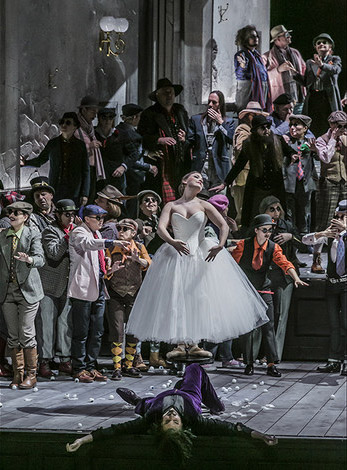
Copyright: Jochen Quast
Tuuli Takala is a very exciting find. Her Olympia was sensational. A full sound with an attractive creamy duskiness and good height, she also has a good trill. She added some beguiling embellishments to her big number that really made a positive difference to the line.
Operatraveller 8.1.2017
Das Ensemble überzeugt. … Tuuli Takala stellt mit brillanten Koloraturen eine fesselnde Olympia auf die Bühne.
The ensemble convinces. … Tuuli Takala sets a captivating Olympia on the stage with brilliant coloratura.
Dietrich Bretz, Südwest Presse 4.1.2017
… im Zentrum das weiße Brautkleid, das faszinierenderweise allen Akteurinnen gut stand: Tuuli Takala als spitzetanzender und blitzblanke Koloraturen singender Olympia,…
… in the center the white wedding dress, which suited all the actresses fascinatingly well: Tuuli Takala as the pointe-dancing and shining coloratura -singing Olympia,…
Jens Daniel Schubert, Sächsische Zeitung 6.12.2016
Hoffmann presst Frauen in Klischees wie Blüten ins Herbarium: Erst Olympia – die Puppe wird echte Ballerina und Hoffmann verschwindet unter ihrem Rock. Verständlich, denn Tuuli Takala zeigt die sängerisch wärmste, schönste und in dieser Rolle deshalb ungewöhnliche Leistung des Abends. Hollywood-Archetyp in etwa die sanfte Julia Roberts.
Hoffmann presses women into stereotypes like flowers into a herbarium: First Olympia – the doll becomes a real ballerina and Hoffmann disappears under her skirt. Understandably so, because Tuuli Takala presents vocally the warmest, most beautiful, and in this role therefore most unusual performance of the evening. A Hollywood-archetype like, for instance, the soft Julia Roberts.
Roland H. Dippel, Concerti Opern-Kritiken 6.12.2016
In vielen Aufführungen werden die drei [Olympia, Antonia, Giulietta] mit einer Sängerin besetzt. Die neue Dresdner Inszenierung von Johannes Errath nahm dafür drei: eine perfekte Sopranistin mit der Finnin Tuuli Takala aus dem Jungen Ensemble blitzsauber und faszinierend in der Darstellung, …
In many productions are all three [Olympia, Antonia, Giulietta] cast with one singer. The new staging in Dresden by Johannes Erath took instead three: a perfect soprano in the Finnish Tuuli Takala from the Young Ensemble, sparkling pure and fascinating in her portrayal, …
Friedbert Streller, Musik-in-Dresden 7.12.2016
Zuerst verliebt er sich in die schöne Olympia, in deren Rolle die Sopranistin Tuuli Takala mit herrlichen Koloraturen glänzt. Zu spät erkennt Hoffmann, dass seine Angebetete nur eine leblose Puppe ist.
At first he falls in love with the beautiful Olympia, in whose role the soprano Tuuli Takala shines with magnificent coloratura. Too late realizes Hoffmann that his beloved is only a lifeless doll.
Wochenkurier 8.12.2016
So wandert Hoffmann rückblickend in die Welten von ganz unterschiedlichen Frauen, jede im weißen Tüllkleid und mit bezaubernder Stimme versehen: Die Finnin Tuuli Takala singt Olympia mit süßem, glockenklaren Sopran, wirkt zerbrechlich wie Porzellan, wenn sie auf Zehenspitzen tanzt.
Thus wanders Hoffmann retrospectively in the worlds of completely different women, each in a white tulle-dress and with an enchanting voice: The Finnish Tuuli Takala sings Olympia with a sweet soprano as clear as a bell, and she seems fragile like porcelain when she dances on tiptoes.
Nicole Czerwinka, Elbmargarita 6.12.2016
Die Sopranistin Tuuli Takala aus dem Jungen Ensemble der Semperoper singt die Koloraturarie der Puppe Olympia beeindruckend, der gefährliche Reiz der Automatenkoloraturen wird sich noch einstellen.
The soprano Tuuli Takala from the Young Ensemble of the Semperoper sings the coloratura-aria of the doll Olympia impressively, the dangerous charm of the automaton-coloraturas is yet to appear.
Boris Gruhl, Dresdner Neueste Nachrichten (paper version) 6.12.2016
F. Poulenc: Gloria
(Tampere Hall, Tampere, Finland 4.11.2016)
Kuoro ja sopraano lauloivat enkelimäisesti.
… Esityksen varsinainen enkeli oli kuitenkin sopraano Tuuli Takala, jonka sisääntulo kolmannen osan Domine Deus -kommentilla oli harvinaisen kaunis ja koskettava hetki.
Takala ilmaisi musiikin ja teoksen sanomaa muutenkin hyvin herkällä ja eleettömällä intensiteetillä. Lopun Amen oli puhtaudessaan aivan ihastuttavan kirkas ja nöyrä musiikillinen tuokio.
The choir and the soprano sang angelically.
… However, the true angel of the performance was soprano Tuuli Takala, whose entrée in the third movement with “Domine Deus” was an exceptionally beautiful and touching moment.
Takala expressed the message of the music and the whole piece in a very sensitive and peaceful intensity. The “Amen” in the very end was in all its purity an exquisitely bright and humble musical instant.
Harri Hautala, Aamulehti 6.11.2016
W.A. Mozart: Don Giovanni / Zerlina
(Savonlinna Opera Festival 2016)
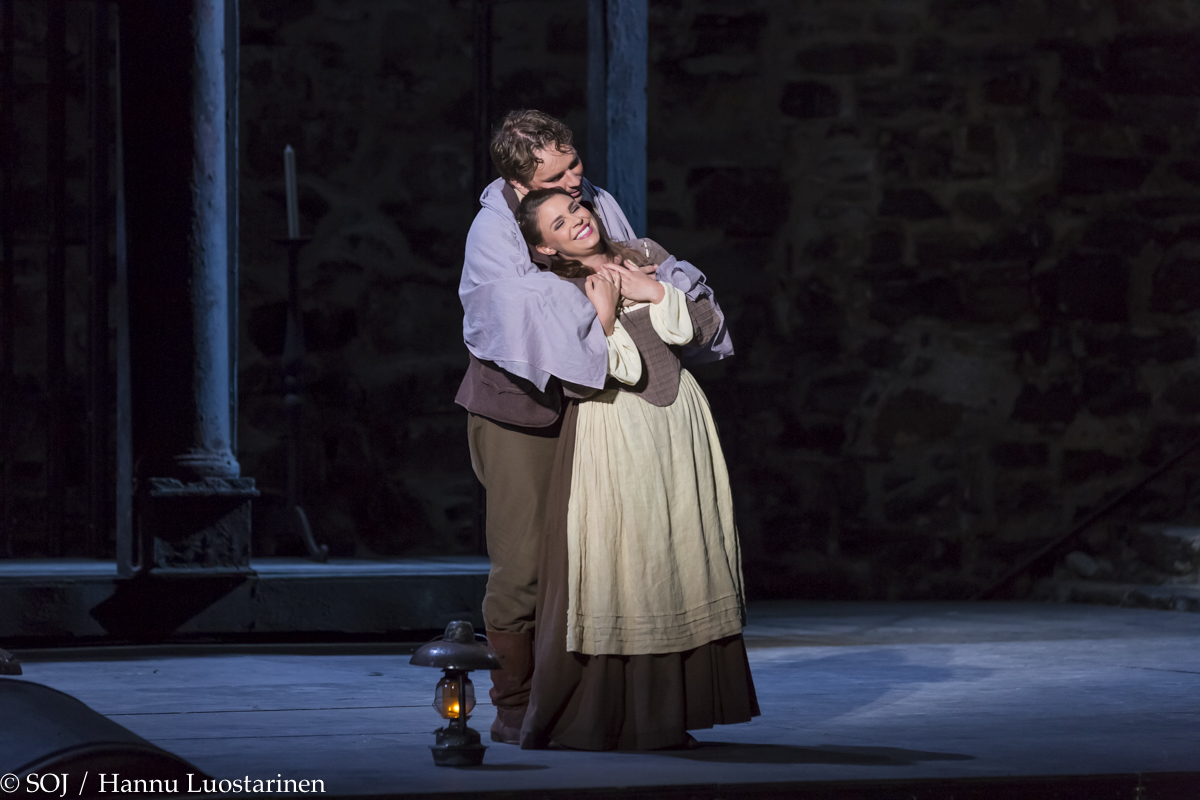
Copyright: Hannu Luostarinen
Don Giovanni -miehityksen kruunu oli Dresdenin Semperoperin kiinnittämä nuori sopraano Tuuli Takala. Hän sai maalaisneito Zerlinan roolissa kriitikon höpertyneen hymyn valtaan. Miten kaunista ja luontevaa Mozart-laulamista! Ja hyvää näyttelemistä!
The crown of the Don Giovanni cast was young soprano Tuuli Takala, currently engaged by the Semperoper Dresden. As the country-maid Zerlina, she manages to lead this critic into the midst of an intoxicated smile. What beautiful and natural Mozart-singing! And good acting!
Vesa Sirén, Helsingin Sanomat 10.7.2016
Natürlich lässt der übliche „Savonlinna roar“, mit der alle Leistungen falls differenzierungslos akklamiert werden, keine Rückschlüsse auf die tatsächliche Qualität zu, doch zumindest nach meiner Meinung hoben sich drei Leistungen positiv aus dem Rahmen einer insgesamt durchschnittlichen bis problematischen Besetzung ab. Nach ihrer Königin der Nacht an der Finnischen Nationaloper erbrachte die junge Tuuli Takala mit ihrer Zerlina wieder eine Probe ihrer außergewöhnlich schönen, gerade für dieses Fach hervorragend geeigneten Stimme. Auch wenn sie sich der Schwierigkeiten der Königin der Nacht imponierend entledigt hatte, kommen hier, im lyrischen Bereich, ihre Stärken am überzeugendsten zur Geltung.
Of course the usual „Savonlinna roar“ – with all performances acclaimed, if without differentiation – leaves no conclusions about the actual quality, but at least in my opinion there were three performances, which positively elevated themselves from the framework of an overall average to problematic cast. After her Queen of the Night at the Finnish National Opera, the young Tuuli Takala rendered with her Zerlina yet another sample of her exceptionally beautiful voice superbly suited just for this fach. Even if she tackled the difficulties of the Queen of the Night impressively, it was here – in the lyric range – where her strengths most convincingly came forth.
Sune Manninen, Der Neue Merker Online 9.7.2016
Wie schon in der Premiere wiederholten Zerlina, Ottavio und Komtur ihre ausnehmend guten Leistungen, Tuuli Takala mit einem schon auf größere Aufgaben (nächstes Jahr Gilda in Savonlinna) hinweisenden wunderschön lyrischen Material, …
As already in the Premiere, Zerlina, Ottavio and the Komtur repeated their exceptionally good performances – Tuuli Takala with a gorgeous lyric material, already pointing to bigger tasks (next year Gilda in Savonlinna)…
Sune Manninen, Der Neue Merker Online 18.7.2016
Valovoimaisen Tuuli Takalan luontevasti resonoiva, kaunis ääni on hunajaa korville, ja Zerlinasta kasvaa merkittävä hahmo.
The naturally resonant, beautiful voice of luminous Tuuli Takala is honey to the ears, and the character of Zerlina grows to be significant.
Riitta-Leena Lempinen-Vesa, Itä-Savo 11.7.2016
Tuuli Takala osoitti Zerlinan roolissa kehittyneensä vahvaksi lavaesiintyjäksi, jonka ääni on paitsi kaunis myös huomattavan kantokykyinen.
In the role of Zerlina, Tuuli Takala demonstrated that she has become a strong stage performer, whose voice is not only beautiful but carried also remarkably well.
Päivi Loponen-Kyrönseppä, Aamulehti 10.7.2016
Tasapainoa löytyi myös Masetto-talonpojan ja Zerlina-maalaistytön presenssistä. Basso Jussi Merikannon Masetto oli silmin nähden ja korvin kuullen vihainen hänen morsiantaan vikitelleelle Don Giovannille, ja Tuuli Takalan upeita sävyjä sisältänyt sopraano ihastutti useamman kerran.
Balance [to the performance] was found also in the presences of peasant-Masetto and country girl -Zerlina. Bass Jussi Merikanto was visibly and audibly angry at Don Giovanni, who seduces his fiancée, and the soprano of Tuuli Takala, which contained stunning tones, enchanted time after time.
Jyri Ojala, Savon Sanomat 11.7.2016
Med sin vackra klang var Tuuli Takala väl värd den stormapplåd hon fick för sin Zerlina.
With her beautiful sound, Tuuli Takala was well worth the storm of applause she received for her Zerlina.
Jan Granberg, HBL 11.7.2016
W.A. Mozart: Die Zauberflöte / the Queen of the Night
(The Finnish National Opera 2016)
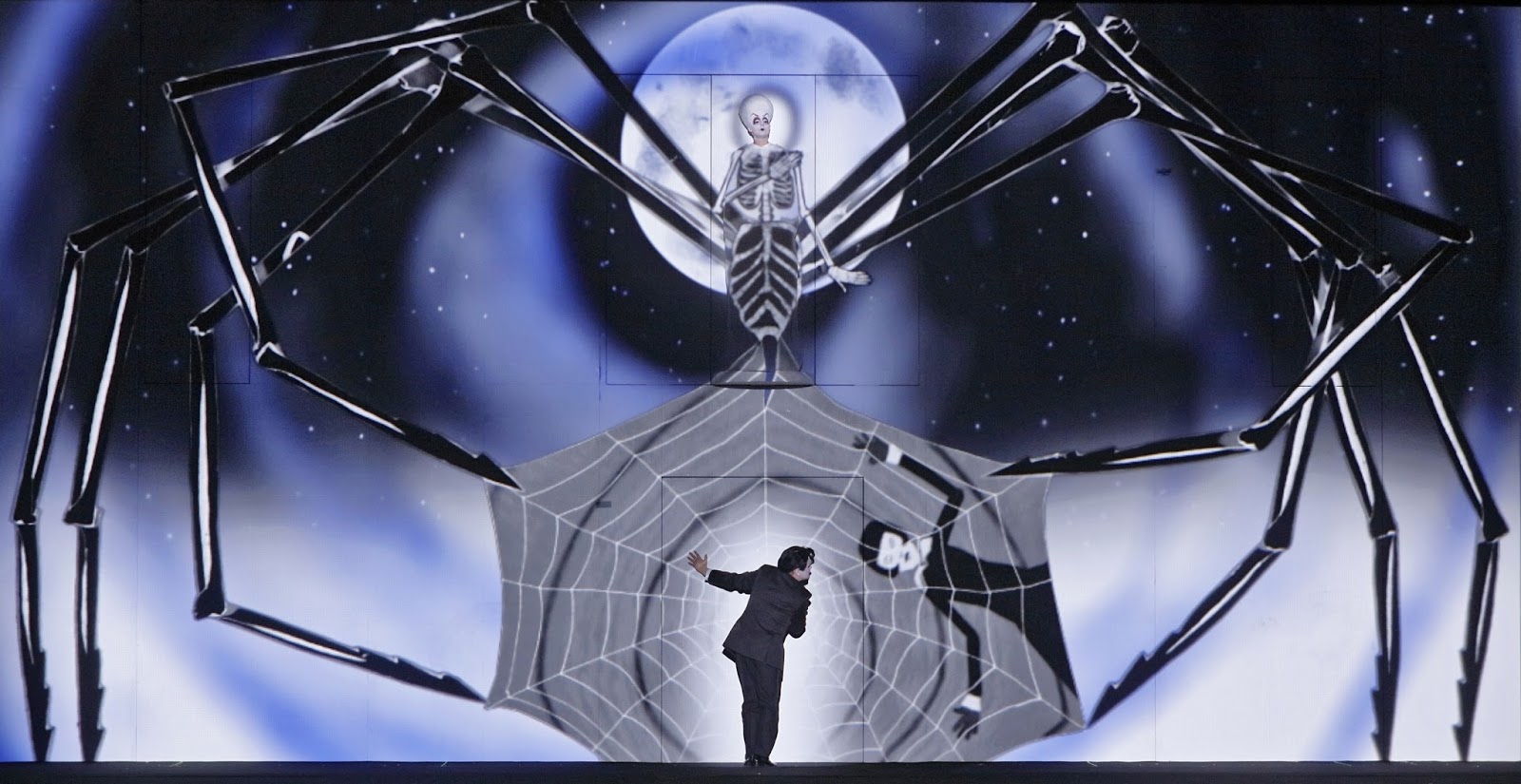
Copyright: Heikki Tuuli
Sopraano Tuuli Takala on tähtiloistoinen Yön kuningatar.
Soprano Tuuli Takala is a star-brilliant Queen of the Night.
Hannu-Ilari Lampila, Helsingin Sanomat 28.2.2016
Tuuli Takala oli suvereeni Yön kuningatar…
Tuuli Takala was a sovereign Queen of the Night…
Harri Kuusisaari, ESS 27.2.2016
Nattens drottning är en av verkets mest originella gestalter, som bara gör två egentliga framträdanden. Visst har man hört mera skrämmande gestaltningar av henne, men Tuuli Takala, verksam i Dresden, har en härligt vacker stämma och sjunger rent och skönt.
The Queen of the Night is one of the most eccentric characters of this work, making only two essential appearances. Certainly one has heard more frightening expressions of her, but Tuuli Takala, active in Dresden, has a gorgeous voice and sings with purity and beauty.
Wilhelm Kvist, Hufvudstadsbladet 27.2.2016
Tuuli Takala on huippukorkeassa Yön kuningattaren roolissa (tällä kertaa mielikuvituksellisen hämähäkkivartalon saaneena) jo konkari ja taituri, joka ansaitsi aplodimyrskynsä.
Tuuli Takala is already a veteran and virtuoso in the extremely high role of the Queen of the Night (this time in the imaginative body of a giant spider), who well deserved her storm of applause.
Lauri Mäntysaari, Turun Sanomat 28.2.2016
G.F. Händel: The Messiah
(Tampere-talo, Finland 2015)
Marjukka Tepponen ja Tuuli Takala toivat sopraanoaarioihin sopivan erilaista sävyä, Tepponen oopperamaisempaa ja Takala instrumentaalisempaa ilmettä. … Takalan äänen puhdas kirkkaus valaisi esityksen joka kerta syttyessään, kauneimmin ehkä viimeisessä aariassa ennen kuorofinaalia.
Marjukka Tepponen and Tuuli Takala brought a fitted amount of different tone to the soprano arias, Tepponen more of an operatic and Takala more of an instrumental expression. … The pure radiance of Takala’s voice illuminated the performance every time it lit up, perhaps most beautifully in the last aria before the choral finale.
Harri Hautala, Aamulehti 22.12.2015 (paper version)
W.A. Mozart: Die Zauberflöte / the Queen of the Night
(Theater Bielefeld 2015)
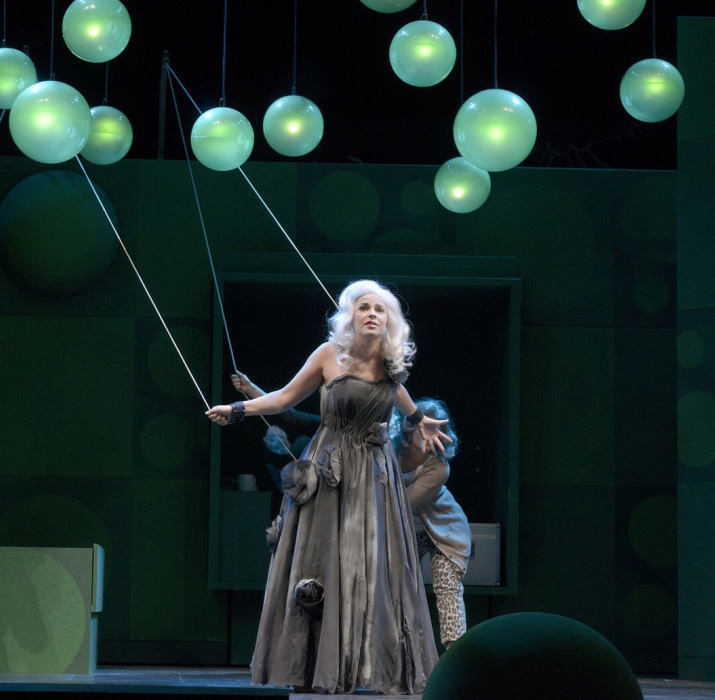
Eine stimmliche Sensation gibt es allerdings auch zu vermelden: Tuuli Takala muss sich zwar bewegen wie eine zerbrochene Olympia-Puppe, singt aber mit dem Strahl der sternflammenden Königin – inklusive aller Spitzentöne, Koloraturen und Emotionen.
A vocal sensation is yet also to be reported: Tuuli Takala must indeed move like a broken Olympia-doll, but sings with the beam of a star-flaming Queen – including all the top-notes, coloraturas and emotions.
Rebecca Hoffmann, Opernnetz 16.10.2015
Tuuli Takala (Foto) erfüllt die Rolle der ´Königin´ grandios.
Tuuli Takala, die einzige Gastkünstlerin des Abends, was für die Qualität des Bielefelder Ensembles spricht, erweist sich als grandiose Sopranistin: bezwingende Bühnenpräsenz, Anmut in den tragischsten Posen, die Stimme glasklar und zugleich warm und geerdet, makellos und bestechend in den höchsten Höhen der Rachenarie.
Tuuli Takala (Photo) fulfills the role of the ´Queen´ fantastically.
Tuuli Takala, the only guest artist of the evening, which speaks of the quality of the Bielefeld Ensemble, proves out to be a terrific soprano: compelling stage presence, grace in the most tragic poses, the voice glass-clear but at the same time warm and grounded, immaculate and impressive in the highest heights of the vengeance-aria.
Johannes Vetter, Neue Westfälische 28.9.2015
Tuuli Takala (27) brilliert als Königin der Nacht.
… Wie ein Deus ex machina steigt eine angestaubte Königin der Nacht aus einer Kiste empor. … Tuuli Takala gelingt in dieser Rolle etwas Grossartiges: Die erst 27-jährige Sopranistin meistert die Höhen und Koloraturen ihrer Arien mit stimmlich überragender Vitalität und Brillanz. Sie mimt aber zugleich die ungelenke Marionette, die eigentlich schon ausgedient hatte, aber aus der Not heraus noch einmal hervorgeholt wurde.
Tuuli Takala (27) shines as the Queen of the Night.
… Like a Deus ex machina a dusty Queen of the Night rises up from a box. … Tuuli Takala succeeds in this role as something grand: the only 27-year-old soprano masters the heights and coloraturas of her arias with vocally paramount vitality and brilliance. At the same time she also acts the unwieldy puppet, which had actually already had its day, but out of necessity was once more brought forth.
Uta Jostwerner, Westfalen-Blatt 28.9.2015 (paper version)
W.A. Mozart: Le Nozze di Figaro / Barbarina
(Semperoper Dresden at the Savonlinna Opera Festival, Finland 2015)
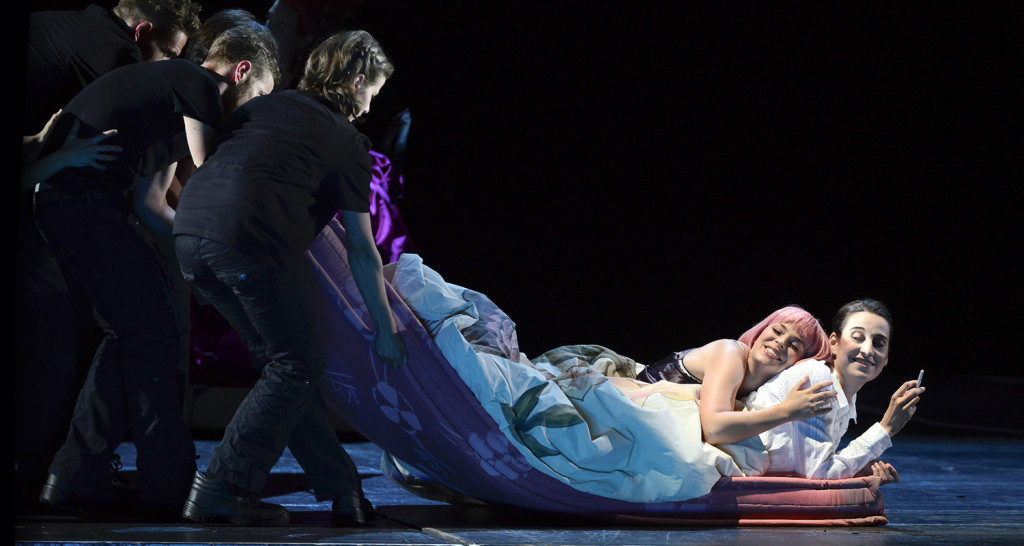
… ja sama korkea taso säilyi pienempien roolien miehityksessä Barbarinaa eli Tuuli Takalaa myöten. Takala on juuri valittu Semperoperin “Junges Ensembleen”, mutta hän otti täysin paikkansa myös varsinaisessa ensemblessa. Takala saapui lavalle pelehtien paitulissa Cherubinon kanssa, ja myöhemmin hän lauloi Neula-aariassa koskettavasti koko produktion ydintä. Kateissa ei lopulta ole vain neula, vaan mennyt aika ja sen viattomuus.
… and the same high level remained in the smaller roles, reaching all the way to Barbarina [performed] by Tuuli Takala. Takala has just been chosen to join the “Junges Ensemble” [of the Semperoper Dresden], but she completely took her place in the actual ensemble as well. Takala entered the stage fooling around with Cherubino in a nightie, and later in the Needle-aria she sung touchingly, grasping the core of the whole production. Lost was not only the needle, but in the end the entire bygone time and its innocence.
Vesa Sirén, Helsingin Sanomat 14.7.2015
Tuuli Takala lauloi koskettavasti Barbarinan aarian ja loisti pienessä, mutta sävykkäässä roolissaan.
Tuuli Takala sang the aria of Barbarina touchingly and shined in the small yet nuanced role.
Riitta-Leena Lempinen-Vesa, Länsi-Savo 14.7.2015
Laulajat ovat tasokkaita, energisiä ja roolihahmojensa näköisiä. Huipputaloon kiinnitetty suomalaissopraano Tuuli Takala on suloinen ja viettelevä, mutta myös rakkaudessa pettyvä Barbarina, ikuinen toinen nainen.
The singers are upscale, energetic and look like their role characters. Finnish soprano Tuuli Takala, who has been engaged to the top opera house, is a sweet and seductive Barbarina, who gets deceived by love and remains forever the other woman.
Savon Sanomat 14.7.2015
Förra Mustakalliosegraren Tuuli Takala har nyligen fått fast anställning vid Semper Oper och hon sjöng Barbarinas sång om den försvunna nålen riktigt vackert.
The latest winner of the [Timo] Mustakallio singing competition, Tuuli Takala, has recently received a fixed engagement at the Semperoper, and she sang Barbarinas song of the lost needle truly beautifully.
Jan Granberg, Hufvudstadsbladet 15.7.2015
Suomalainen Tuuli Takala täytti niin ikään paikkansa ensemblessä mallikkaasti Barbarinan roolissa.
Also in the role of Barbarina Finnish Tuuli Takala filled her place in the ensemble in an exemplary fashion.
Jussi Mattila, Keskisuomalainen 15.7.2015
34th International Hans Gabor Belvedere Singing Competition (Amsterdam 2015)
Unbedingt erwähnt sei auch die Finnin Tuuli Takala, ein lyrischer Sopran mit fülligem Timbre und bestechender Koloratursicherheit als Königin der Nacht.
One should absolutely mention also the Finnish Tuuli Takala, a lyric soprano with rich timbre and brilliant, secure coloraturas as the Queen of the Night.
Gerhard Persché, Opernwelt Magazine Sept./Oct. 2015, page 81
Four singers stood out in particular in the finals for their outstanding musicianship, distinctive voices and their powerful ability to communicate to an audience. … The 27-year-old Finnish soprano Tuuli Takala is already establishing herself on the international stage. In the Belvedere finals, she showed exceptional poise and control in her beautifully phrased and nuanced performance of the Queen of the Night’s ‘O zittre nicht’ from The Magic Flute.
Opera Now Magazine 6.7.2015
Een voorbeeldig Mozartiaan toonde zich echter Tuuli Takala, de naam die ik aankruiste op mijn stemformuliertje. Haar verschroeiende Koningin van de Nacht maakte zo mogelijk nog meer indruk in het recitatief dan in de coloraturen. Ze viel niet in de prijzen, maar twee aangeboden engagementen verzachtten ongetwijfeld de teleurstelling.
An exemplary Mozartian was however found in Tuuli Takala, the name which I ticked into my voting form. Her searing Queen of the Night was, if possible, even more impressive in the recitative than in the coloraturas. She did not receive main prizes, but the two offered engagements undoubtedly alleviated the disappointment.
Martin Toet, Operamagazine.nl 6.7.2015
On critique, on pinaille mais si on coupe ainsi les cheveux en quatre, c’est parce qu’au-dessus de cette mêlée déjà remarquable, se détachent cinq chanteurs difficiles à départager tant leurs qualités, indéniables, sont peu comparables. Quel rapport entre Kangmin Justin Kim et Tuuli Takala ? Le premier, célèbre pour son… … La seconde n’en est pas moins sensationnelle, elle qui d’un soprano solide, presque dramatique par l’ampleur extrait, dans la première aria de la Reine de la nuit des suraigus d’une précision stupéfiante. Comment expliquer qu’aucun des deux chanteurs ne repartent avec un prix si ce n’est par le fait que l’avis du jury, au contraire du nôtre, se base sur l’écoute de plusieurs airs?
We criticize, we nitpick, we split hairs but this is because above this already remarkable pack stand out five singers, difficult to decide between, as their qualities are undeniably not comparable. What is the relationship between Kangmin Justin Kim and Tuuli Takala? The first, celebrated for his… … The second [Takala] is no less sensational. She has a solid soprano voice, almost dramatic in extracted magnitude, and of stunning precision in the heights of the first aria of the Queen of the Night. How to explain that neither one of these two singers go back with a prize, other than by the fact that the opinion of the jury, unlike ours, is based on listening to several arias?
Christophe Rizoud, Forumopera.com 4.7.2015
Er hätte bei mir Platz 4 belegt – aber genauso wie mein persönlicher Platz 2, bekam er auch keinen offiziellen Stockerlplatz! Sie war die zweite großartige Mozart-Interpretin des Abends, die 28 jährige kleine Finnin Tuuli Takala, die mit Attacke und passendem Material, so gar nicht piepsig, glasklare Koloraturen der Königin der Nacht ins Auditorium pfefferte! Ausserdem trug sie das geschmackvollste Kleid des Abends und wirkte sehr professionell – immerhin hat sie diese Partie auch schon in Helsinki und beim Savonlinna Festival gesungen. Brava!
He [Krizaj] would have placed 4th in my opinion – but just as my personal 2nd Place [Takala], he did not receive any official podium place either! The 28-year-old small Finnish [soprano] Tuuli Takala was the second superb Mozart interpreter of the evening, who with attack and suitable material, not at all squeaky, peppered crystal-clear coloratura of the Queen of the Night into the auditorium! Furthermore she wore the most tasteful dress of the evening and acted very professional – after all, she has sung this role already in Helsinki and at the Savonlinna Festival. Brava!
Michael Tanzler, Der Neue Merker online 4.7.2015
W.A. Mozart: Le nozze di Figaro / Barbarina
(Semperoper Dresden 2015)
… Dass diesem tollen Tag der nächste folgen wird, steht außer Frage. Dann wird vielleicht Tuuli Takala, die hier als Barbarina mit ihrem leicht geführten und von dunkler Sinnlichkeit grundierten Sopran auf sich aufmerksam macht, die Künste der Verführung gänzlich beherrschen. Sie wäre nicht die erste Sängerin dieser Partie, die sich zur Susanna und dann auch zur Gräfin entwickelt hätte.
… There is no question, that this great day will be followed by the next. Then perhaps Tuuli Takala – who here attracts attention as Barbarina with her easily flowing soprano primed with dark sensuality – masters the art of seduction entirely. She would not be the first singer of this role, who developed to be Susanna and then also the Countess.
Boris Gruhl, Dresdner Neueste Nachrichten 22.6.2015 (paper version)
Traurig singt die Barbarina – Hörens- und sehenswert ist Tuuli Takala, die als Barbarina mit ihrem traurigen Lied von der Verlorenen die Tiefendimension öffnet.
Barbarina sings of sorrow – Worth hearing and worth seeing is Tuuli Takala, who as Barbarina with her sad song of loss opens up a dimension of depth.
Jens Daniel Schubert, Sächsische Zeitung 22.6.2015 (paper version)
Die zweite große Arie der Gräfin wird bei Sarah-Jane Brandon dann aber zum vokalen Glanzstück. Und Tuuli Takala fügt mit der kleinen, aber feinen Arie der Barbarina “Ich habe sie verloren” noch eines hinzu.
The second major aria of the Countess was then made by Sarah-Jane Brandon into a vocal showpiece. And Tuuli Takala added yet another one with the small but fine aria of Barbarina “I have lost it”.
Joachim Lange, Online Musik Magazin 23.6.2015
Wie es scheint, hat die lustvolle Atmosphäre von Oper und szenischer Umsetzung das gesamte Ensemble – zu dem auch eine quicklebendige Tuuli Takala als Barbarina und … gehören – spielfreudig mitgerissen und zu sängerischen Höchstleistungen angesteckt.
It seems that the entire ensemble – to which also includes the lively Tuuli Takala as Barbarina and … – has been swept away to playfulness by the pleasurable atmosphere of opera and scenic implementation, which also infected vocal excellence.
Michael Ernst, Neue Musikzeitung Online 24.6.2015
Eine hübsche, wenn auch äußerlich mit ihrer rothaarigen Pony-Perücke eher kesse, Barbarina mit schöner Stimme war Tuuli Takala
Tuuli Takala was a pretty, yet externally in her red-head Pony-wig a rather saucy Barbarina with a beautiful voice
Ingrid Gerk, Der Neue Merker online
G. Rossini: Il Viaggio a Reims / La Contessa di Folleville
(Sibelius Academy 2015)

Hämmästyksen aiheita on esityksen korkea vokaalinen taso. Sopraanot Tuuli Takala ja Saara Kiiveri ja mezzosopraano Erica Back ovat kirkkaimmat bel canto -tähdet, joissa on helkkyvää vokaalista säteilyä, nuoruuden elinvoimaa ja valloittavaa näyttämöllistä hullutteluhenkeä.
One of the reasons for amazement [in this production] is the high vocal quality. Sopranos Tuuli Takala and Saara Kiiveri and mezzo-soprano Erica Back are the brightest stars of bel canto, who have ringing vocal radiance, youthful vitality and a captivating whimsical spirit on stage.
Hannu-Ilari Lampila, Helsingin Sanomat 17.4.2015
Till karikatyrerna hör också… den stolliga franska Europarlamentarikern Folleville (Tuuli Takala), som verkligen sjöng briljant.
To the caricature figures belongs also … the crazy French Member of European Parliament Folleville (Tuuli Takala) who indeed sang brilliantly.
Jan Granberg, Huvudstadsbladet 13.4.2015
… oopperaopiskelijat ylsivät tasokkaisiin suorituksiin riehakkaina näyttelijöinä, vapautuneina koristelijoina ja ilmeikkäinä bel canto -laulajina.
Tuuli Takala oli suorastaan suvereeni Folleville…
… The opera students reached high-class performances as rambunctious actors, liberated ornamentors and expressive bel canto -singers.
Tuuli Takala was a downright sovereign Folleville …
Auli Särkiö, Rondo Classic 13.4.2015
W.A. Mozart: Requiem
(Helsinki Philharmonic Orchestra, Helsinki)
… var utförandet i den profana Musikhushelgedomen på anmärkningsvärt hög nivå, inte minst som man hade lyckats engagera en handfull spännande röster. Tuuli Takala är blott 27 år gammal men har en mycket tilltalande sopranröst, och tillsammans med Niina Keitel, Jussi Myllys och Mika Kares formade hon en samstämmig kvartett.
… the delivery in this secular Music House shrine was at a remarkable level, and not least because they had succeeded in engaging a handful of exciting voices. Tuuli Takala is just 27 years old but has a very appealing soprano voice, and together with Niina Keitel, Jussi Myllys and Mika Kares she formed a concordant quartet.
Wilhelm Kvist, Hufvudstadsbladet 1.4.2015
Reviews 2014
Concert of the Young Musicians of the Year 2014
(Pro Musica, Tampere Hall)
Nuori sopraano Tuuli Takala osoittautui Tampere-talossa sekä taitavaksi laulajaksi että kypsäksi tulkitsijaksi.
Leino -laulut olikin tämän vuoden nuorten muusikoiden palkintokonsertin korkein taiteellinen huippu. Sopraano Tuuli Takala osoitti vaativan teoksen parissa sekä huikeaa äänellistä osaamista että kypsää tulkintavoimaa. Suomen kielen pitkät vokaalit ovat innoittaneet Saariahon aivan ihmeellisinä liitäviin melodialinjoihin, jotka Takala hienolla sopraanollaan välitti vaikuttavasti. Sellaiset sanat kuin puut ja muut voisivat tuskin tätä vivahteikkaammin enää soida! Pianisti Ville Matvejeff puolestaan piti hienosti huolta siitä, että laulajan usein tuulen luontevuuden lailla hengittävä ääni sai ympärilleen mahdollisimman kuulaan ja pelkistetyn sointimaailman. Kokonaisuus oli vähäeleisyydestään huolimatta mykistävän intensiivinen ja voimakas.
Takala lauloi miellyttävästi myös Richard Straussin varhaisia liedejä. Sopraanon äänen puhtaus ja tasainen sointi tuottivat näissä klassikoissa horjumattoman varmaotteisia tulkintoja.
The young soprano Tuuli Takala proved out to be both a skillful singer and a mature interpreter in the [concert at] Tampere Hall.
The Leino Songs by Kaija Saariaho were indeed the supreme artistic climax of this year’s award-concert of the Young Musicians of the Year. Soprano Tuuli Takala demonstrated both immense vocal skill and profound interpretative power amidst this demanding piece (song cycle). The long vowel lines of the Finnish language had inspired Saariaho to compose the most marvelous soaring melody lines, which Takala conveyed impressively with her beautiful soprano voice. Words like ‘puut’ (trees) and ’muut’ (others) could hardly sound more nuanced than this! As for pianist Ville Matvejeff, he elegantly took care of the singer’s natural, wind-like breathing voice, creating a clear and reduced timbre around it. The entity [of this song-cycle], despite being unadorned, was stunningly intense and powerful.
Takala also sang early songs by Richard Strauss with equal delight. The purity and smooth tone of the soprano produced unwavering and solid interpretations of these classics.
Harri Hautala, Aamulehti 13.11.2014 (paper version)
W.A. Mozart: Die Zauberflöte / The Queen of the Night
(Savonlinna Opera Festival 2014)
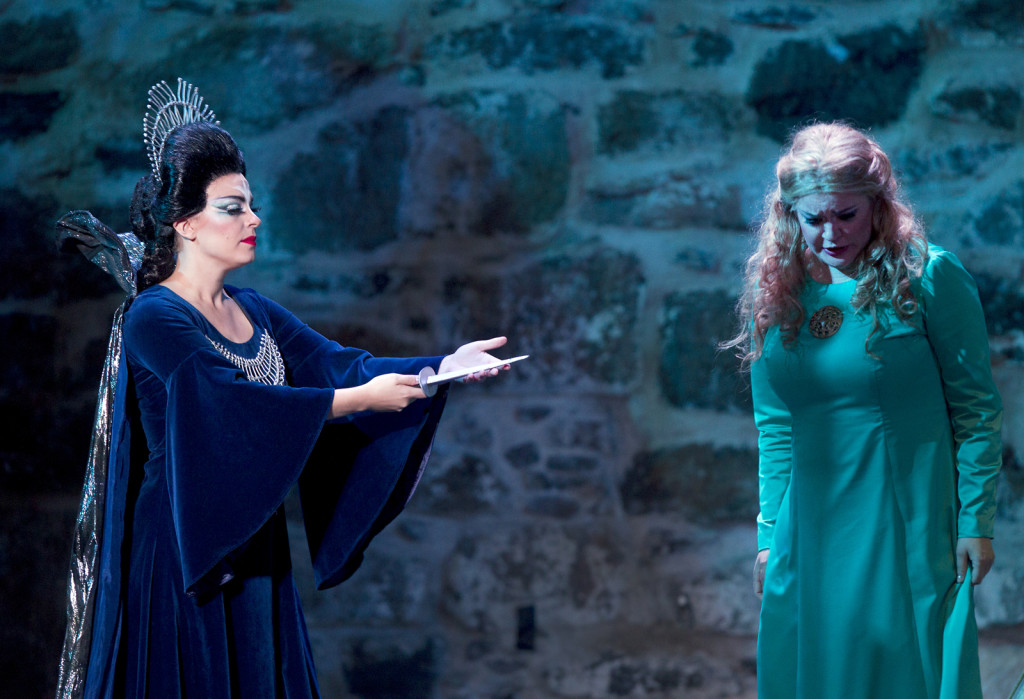
Taikahuilu ,Yön kuningatar -Tuuli Takala
Esityksen tähtiä ovat tenori Tuomas Katajala ja sopraano Tuuli Takala. … Debytantti Tuuli Takala onnistuu häikäisemään Yön kuningattaren rooleissa. Siron kuningatarkaunottaren ääni ponnahtaa ketterästi korkeisiin koloratuureihin ja saa jännittävän villin sävyn.
The stars of the show are tenor Tuomas Katajala and soprano Tuuli Takala. … The debutante Tuuli Takala succeeds to dazzle in the role of the Queen of the Night. The voice of the graceful and beautiful Queen springs easily into the high coloraturas and delivers a thrilling and ferocious tone.
Hannu-Ilari Lampila, Helsingin Sanomat 18.7.2014
Otsikko: Takala ja Immonen loistivat Olavinlinna-debyytissään
Toinen fantastinen Olavinlinna-debyytti oli Yön kuningatar, Mustakallio-voittaja Tuuli Takala, joka hullaannutti lähes täyden katsomon. Takalan korkeimmatkin äänet helkkyvät vapaina ja hopeankirkkaina, ja ennen kaikkea puhtaina. Tuntuu, kuin Takala olisi syntynyt Yön kuningattareksi, niin luontevasti nämä yli-inhimillisen vaikeat aariat taittuvat. Silti laulussa on tarvittavaa vihaa ja voimaa. Myös alarekisterissä on tuimuutta.
Another fantastic debut at the Olavinlinna Castle was the Queen of the Night, portrayed by the winner of the Timo Mustakallio competition Tuuli Takala, who infatuated a nearly full audience. Even the highest tones chimed free and silver-bright, and above all – pure. It feels as if Takala was born to be the Queen of the Night, so naturally she tackled these superhumanly difficult arias. And still there is the needed might and anger in her singing. Also the low register had sternnes.
Riitta-Leena Lempinen-Vesa, Itä-Savo 18.7.2014
Concert in Joensuu 2014
Kumpaakin laulajaa oli yhtä miellyttävä ja mukava kuunnella, mutta Takalan sopraano vaikutti teknisesti hieman varmemmalta ja valmiimmalta. Laulaminen lähenteli todellista lumovoimaa, kun Takala esimerkiksi taituroi Rahmaninovin soinneissa. Takalan sopraano on tasapainoinen – siinä ei varsinaisesti tule mikään osa-alue toisen tukkeeksi ja ääniaines on upea.
Both singers were as pleasant and nice to listen to, but Takala’s soprano seemed technically a bit more confident and more complete. [Her] singing was close to true enchantment when Takala skillfully excelled in the tunes by Rachmaninoff. Takala’s soprano is well balanced and her voice material is gorgeous.
Jyri Ojala, Karjalainen 7.7.2014 (paper version)
The Mustakallio Winners’ Concert 2014
In Takala’s performance one’s attention sticks to an utterly fine vocal technique. Especially in the higher register the singer seems to easily reach all the possible tones and colours from a robust forte to an intangible pianissimo. The use of vibrato is moderate and controlled. The middle register is also strong when needed and the register changes are unnoticeable. Takala shapes the legato lines musically.
Esko Alanen, Itä-Savo 7.7.2014 (paper version)
Pääpalkinnon voittaneella Tuuli Takalalla on terve lyyrinen sopraano, jossa on kiinteä ydin. Soinnissa on myös jopa addiktoivaa persoonallisuutta.
Mozart on omiaan tässä kehitysvaiheessa, ja duetossa Così fan tutte -oopperasta hän tuntui olevan jo nyt kansainvälisesti kiinnostavalla tasolla. Myös Sibeliuksen keveimmät laulut toimivat, samoin jopa Rahmaninov -osuus, mutta osa Richard Straussin lauluista tulee sopimaan Takalan kurkulle paremmin vasta vuosien kuluttua.
The Grand Prize-winning Tuuli Takala has a healthy lyric soprano with a solid core. There is also addictive personality in her sound.
Mozart is apt at this stage of development, and in the duet from Così fan tutte, she seemed to be already at an international level of interest. The lightest songs by Sibelius suited her well, as did also the selection of Rachmaninoff songs. But some of the songs by Richard Strauss will fit Takala’s throat better after some years.
Vesa Sirén, Helsingin Sanomat 7.7.2014
Urkuyö ja Aaria Concert 2014
Sopiva kontrasti irrottelulle syntyi, kun Tuuli Takala lauloi kauniisti, kirkkaasti ja teknisesti varmasti Mozartin motetin Exsultate jubilate. Hurmaava esitys, josta jäi kaipaamaan lähinnä hiljaisia sävyjä.
A fitting contrast to the previous amusement was created when Tuuli Takala sang Mozart’s motet Exsultate Jubilate beautifully, brightly and with technical certitude. It was a charming performance, from which one could only yearn for even more quiet tones.
Veijo Murtomäki, Helsingin Sanomat 7.6.2014
W.A. Mozart: Così fan tutte / Fiordiligi
(Sibelius Academy 2014)

Fiordiligin roolin laulanut sopraano Tuuli Takala on jo hyvää vauhtia lunastamassa lupauksiaan. Fiordiligin vaikeissa aarioissa Takala osoitti hallitsevansa kauniisti avautuvaa ääntään.
Performing the role of Fiordiligi, soprano Tuuli Takala is already well on her way in redeeming her promises as a singer. In Fiordiligi’s demanding arias Takala showed that she is in command of her beautifully opening voice.
Samuli Tiikkaja, Helsingin Sanomat 1.5.2014
Reviews 2013
Sempre, sempre!
(Sibelius Academy 2013)
Show’n uhkasi silti varastaa habitukseltaan tyttömäinen mutta rautaisaa lavakokeneisuutta hehkuva tämän kesän Timo Mustakallio -voittaja Tuuli Takala, jolla on keveän säteilevä, jo varsin mehevä korkea sopraano. Muusikonvalmiutensa hän sai osoittaa antamalla ex-tempore äänensä flunssan uhriksi joutuneelle Johanna Engelbarthille Ruusuritarin ruusunojennuskohtauksessa.
Girlish by her appearance, yet glowing with strong stage experience, Tuuli Takala threatened to steal the show. She has a light, radiating and already rather juicy high soprano. She also got to demonstrate her skills and capability as a musician by borrowing her voice ex tempore for the ensembles from Der Rosenkavalier due to sudden illness of soprano Johanna Engelbarth.
Auli Särkiö, Rondo Classic 6.12.2013
Timo Mustakallio Singing Competition
(Finland 2013)

Helppoa, tarkkaa, luontevaa ja kaunista. Tuuli Takalan laulussa on kaikki kohdallaan.
Tuuli Takalan ihastuttavan raikas Yön kuningattaren aaria hurmasi Olavinlinnan yleisön Mustakallio-kilpailuissa
Harvoin kuulee tätä aariaa laulettuna niin puhtaasti ja tarkasti kuin Takala sunnuntai-iltana. Korkeimmatkin äänet asettuivat tarkasti paikoilleen.
Easy, accurate, natural and beautiful. There is everything in place in Tuuli Takala’s singing.
Tuuli Takala’s enchantingly fresh Queen of the Night’s aria charmed the audience of the Timo Mustakallio competition in Olavinlinna.
You can rarely hear this aria sang as purely and accurately as Takala did on Sunday evening. Even the highest notes were set accurately in their right places.
Riitta-Leena Lempinen-Vesa, Itä-Savo 8.7.2013
Tuuli Takala har en läcker röst, fin musikalitet och bombsäker höjd som gjorde att hon klarade av Nattens drottnings aria Der Hölle Rache ur Trollflöjten med bravur.
Tuuli Takala has a luscious voice, excellent musicianship and bulletproof high notes which all helped her to succeed brilliantly in the Queen of the Night’s aria Der Hölle Rache from the Magic Flute.
Jan Granberg, Huvudstadsbladet 9.7.2013
Hänestä uhkui Olavinlinnan lavalla varmuutta ja karismaa
She transpired confidence and charisma on the stage of the Olavinlinna castle.
Samuli Tiikkaja, Helsingin Sanomat 7.7.2013
Takala eläytyi aarian ankaraan tekstisisältöön vahvasti ja pystyi samalla laulamaan hankalat koloratuurikuviot puhtaasti ja varmasti.
Takala certainly put her soul into the harsh content of the lyrics [of the Queen of the Night aria] and at the same time was able sing the difficult coloratura parts which were pure and doubtless.
Samuli Tiikkaja, Helsingin Sanomat 9.7.2013
Kangasniemi Singing Competition
(Finland 2013)
Soprano Tuuli Takala esiintyi kautta linjan varmasti ja sisäistyneesti. Kaija Saariahon rauha oli koskettavan syvällinen, Poulencin Fagnes de Wallonie napakka ja hyväsointinen. Ohjelman päättänyt Elviran aaria Bellinin oopperasta Puritaanit soi vakuuttavasti, äänen hallinta oli monipuolista ja vivahteikasta.
Soprano Tuuli Takala performed throughout the competition with poise and internalization. Rauha by Kaija Saariaho was touching and profound, Fagnes de Wallonie by Poulenc vigorous with good timbre. The program [in the finals] ended with Elvira’s aria from Bellini’s opera I Puritani, which she delivered convincingly with a versatile use of the voice rich in nuances.
Länsi-Savo 21.7.2013 / paper version